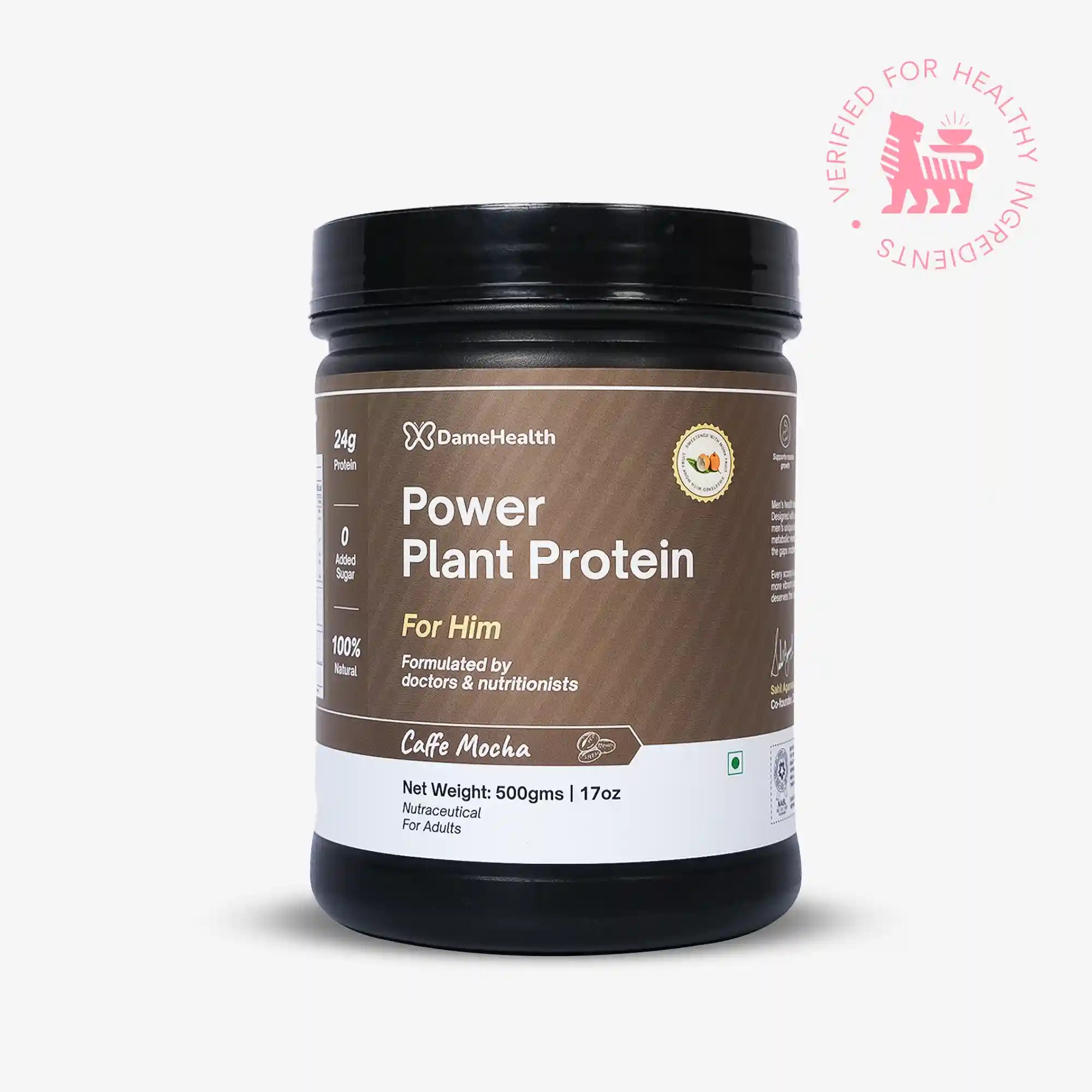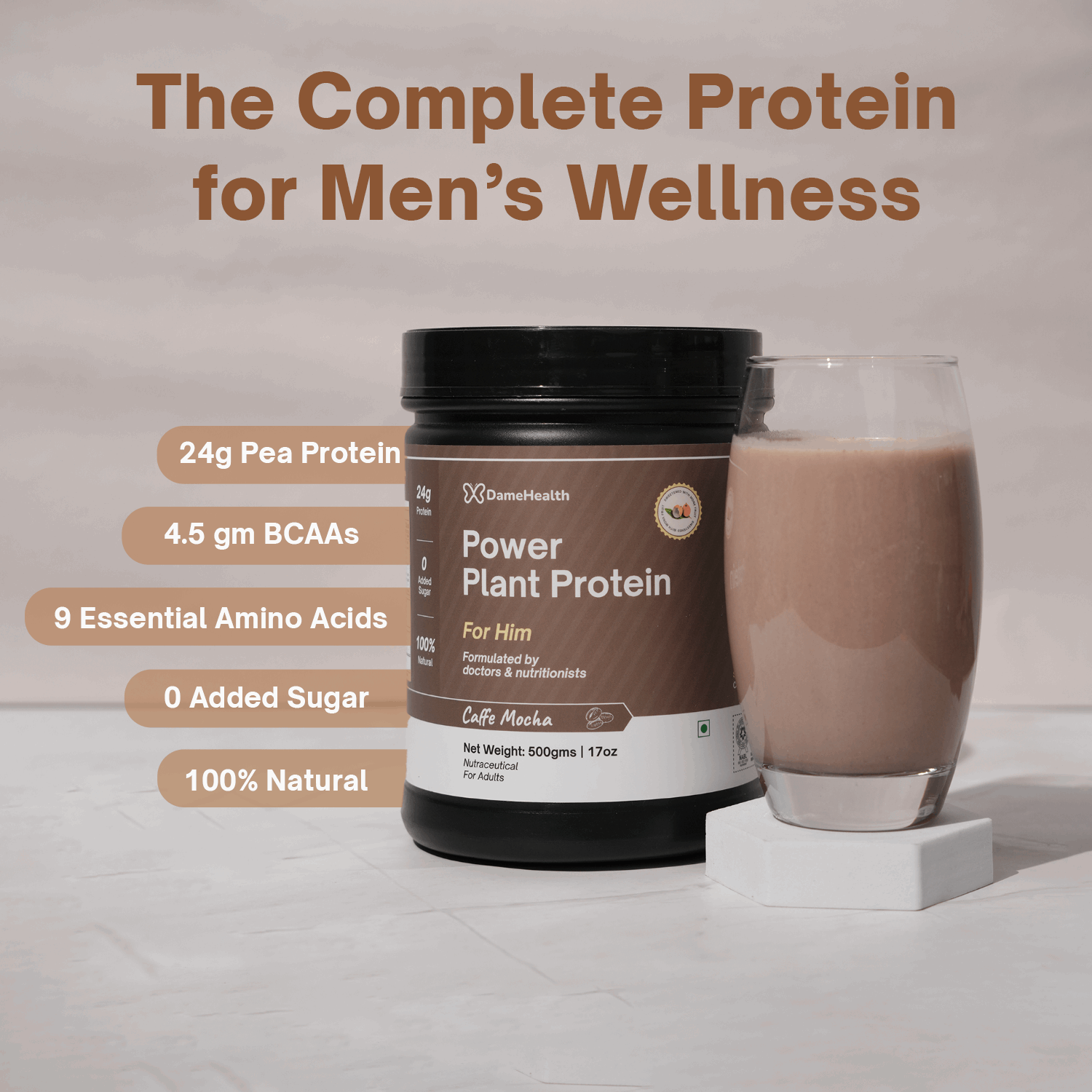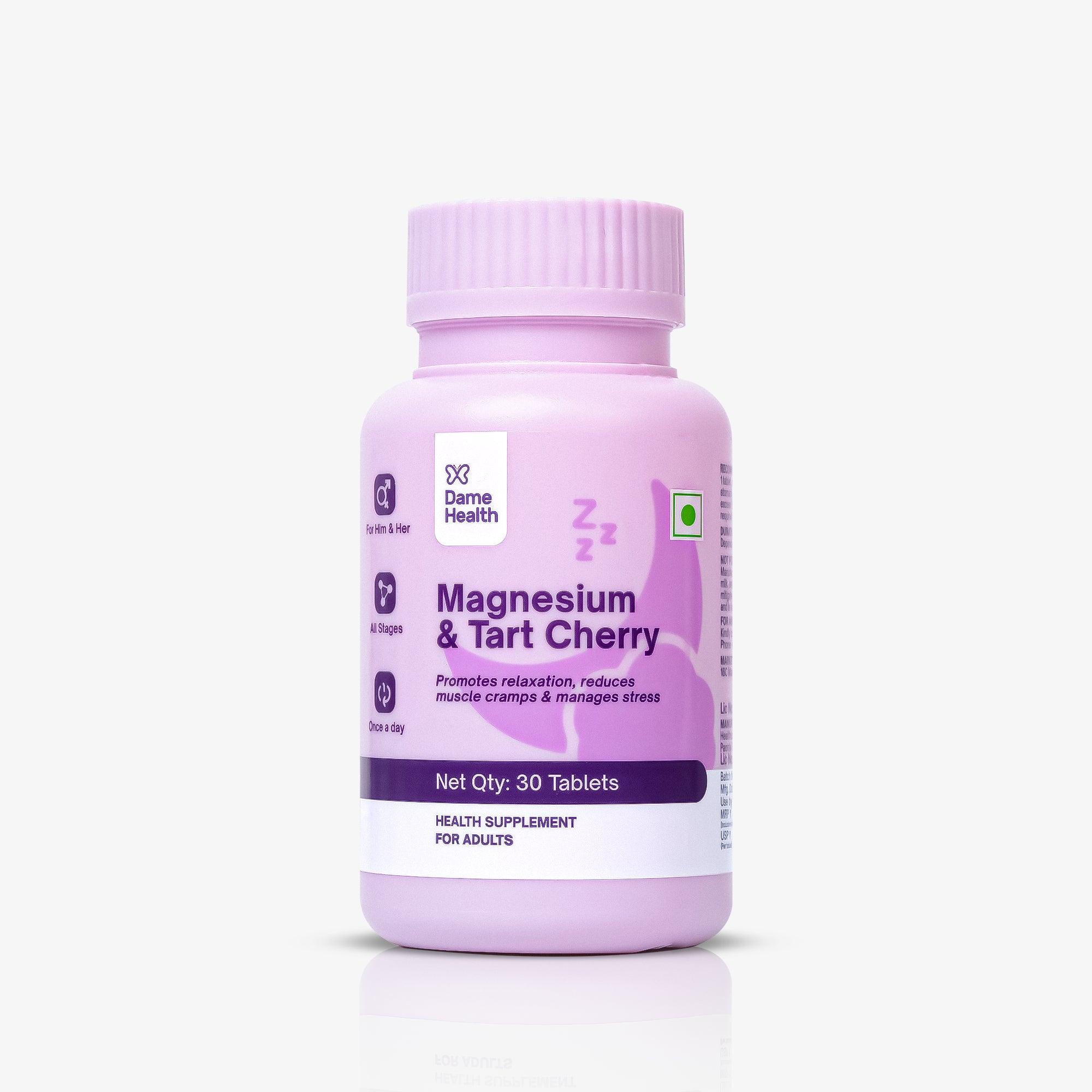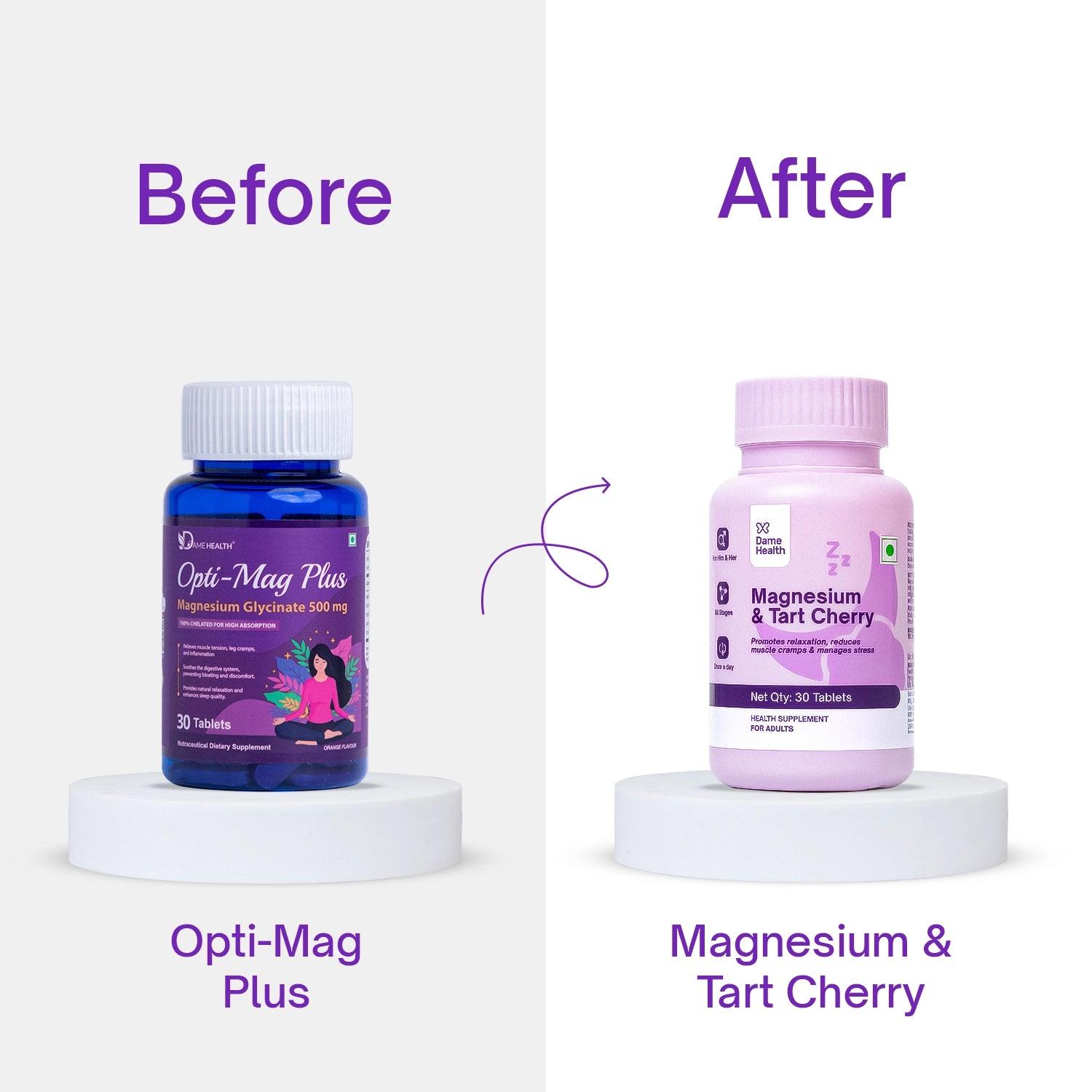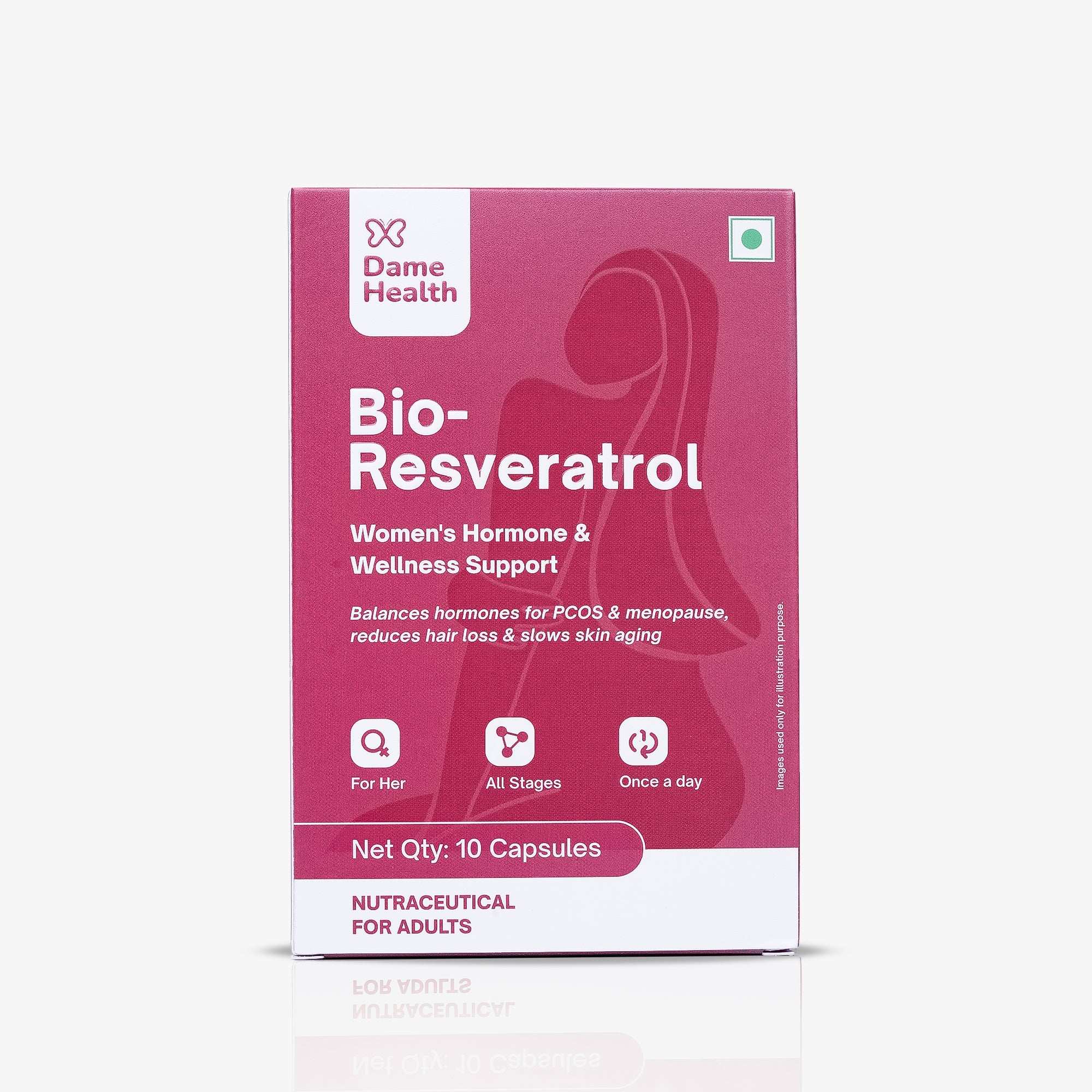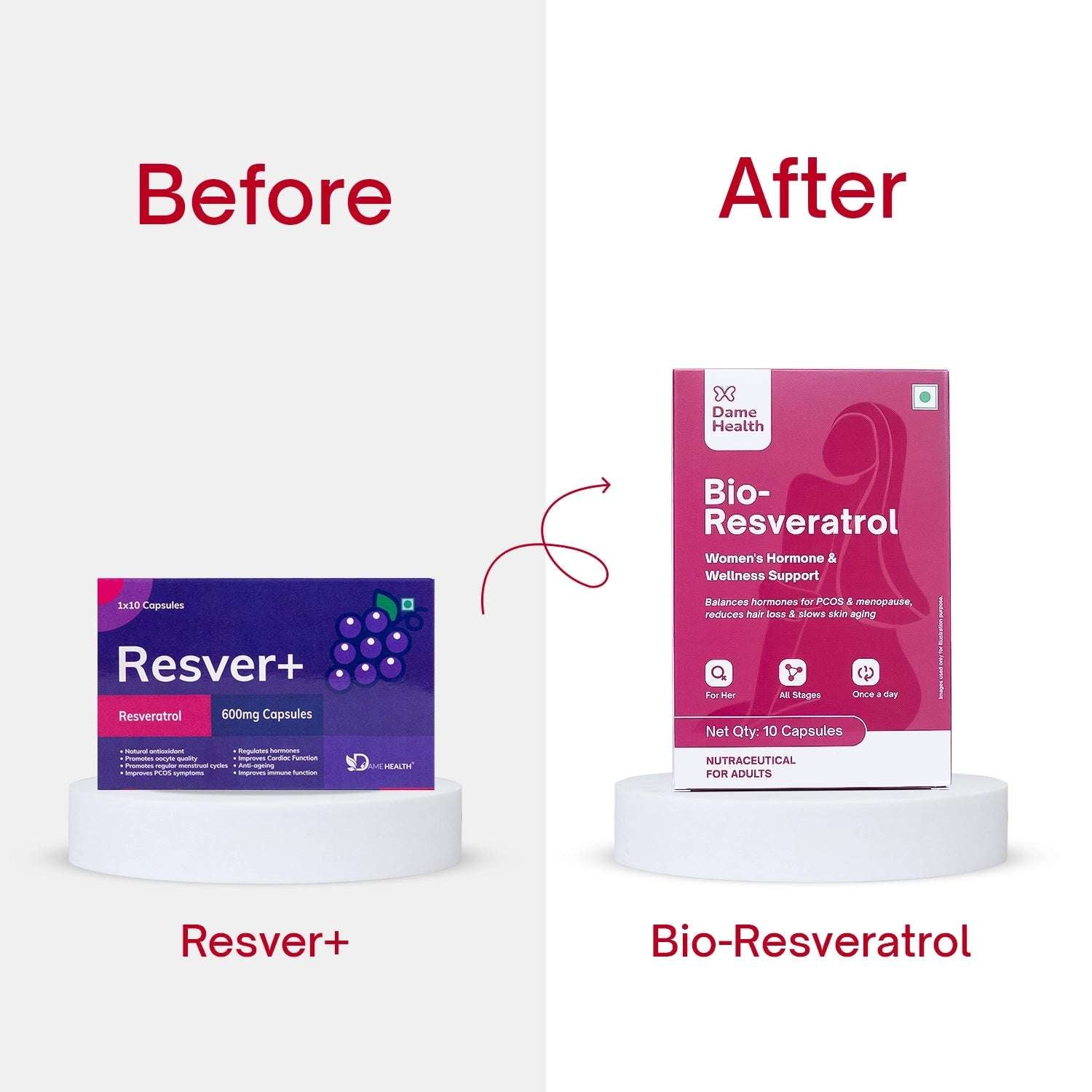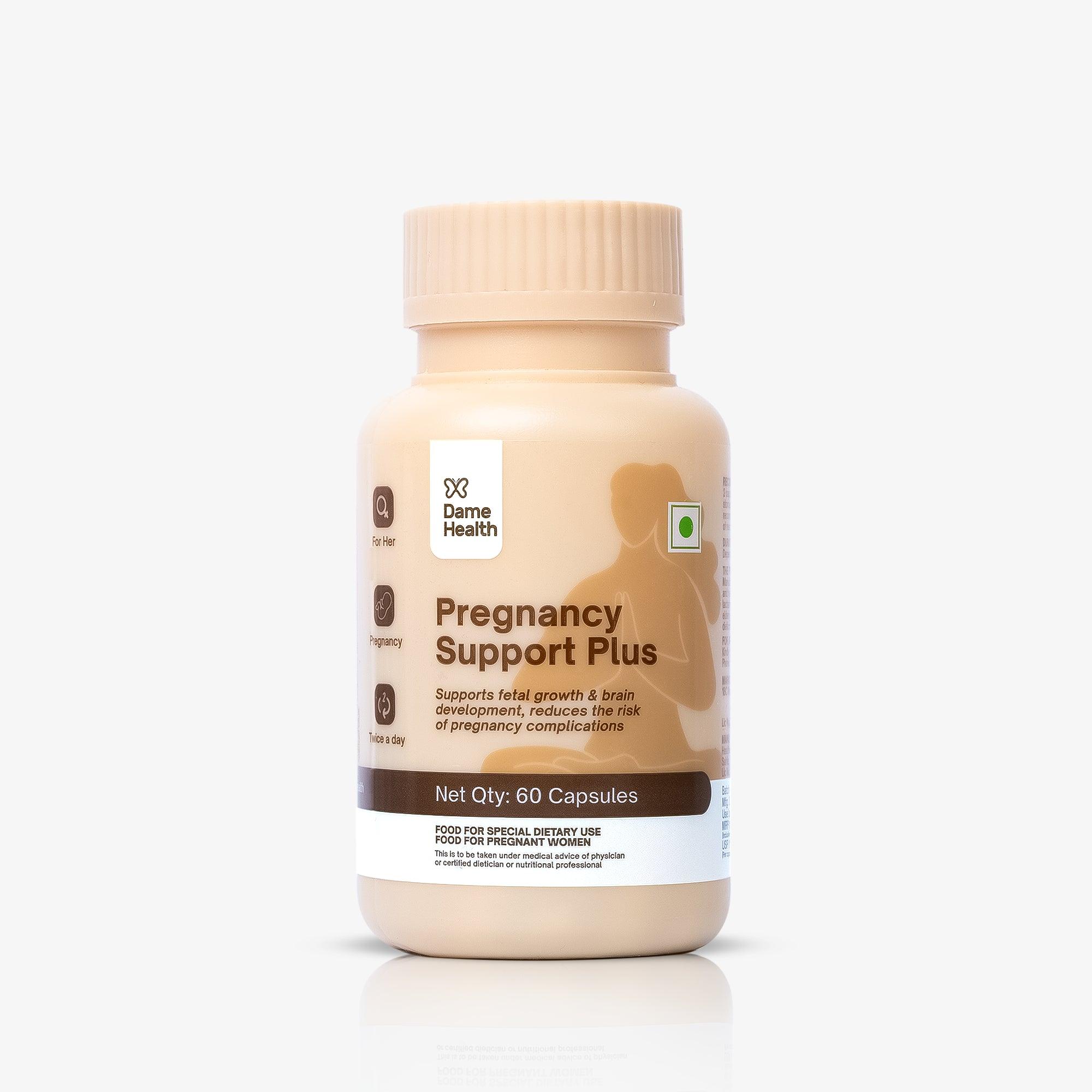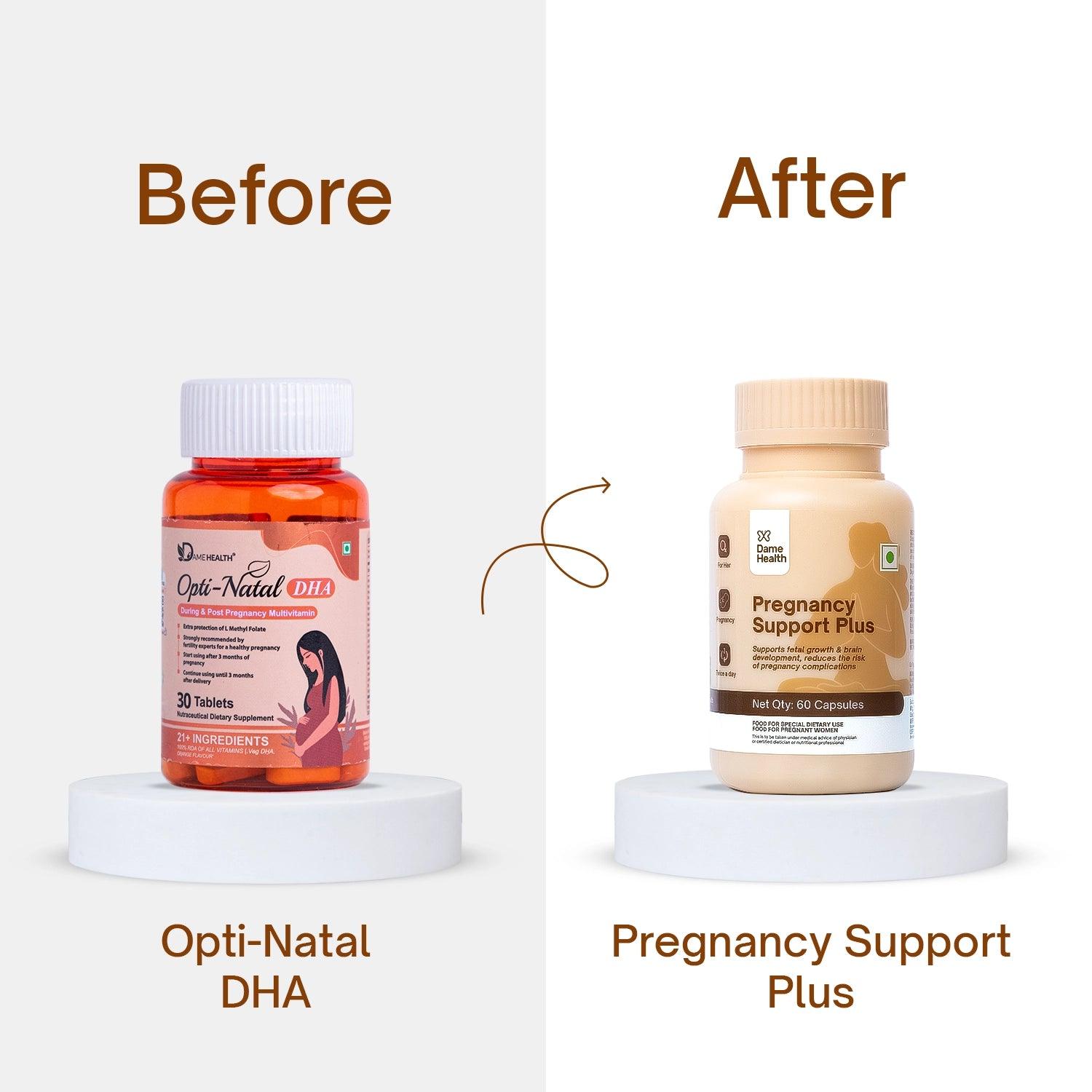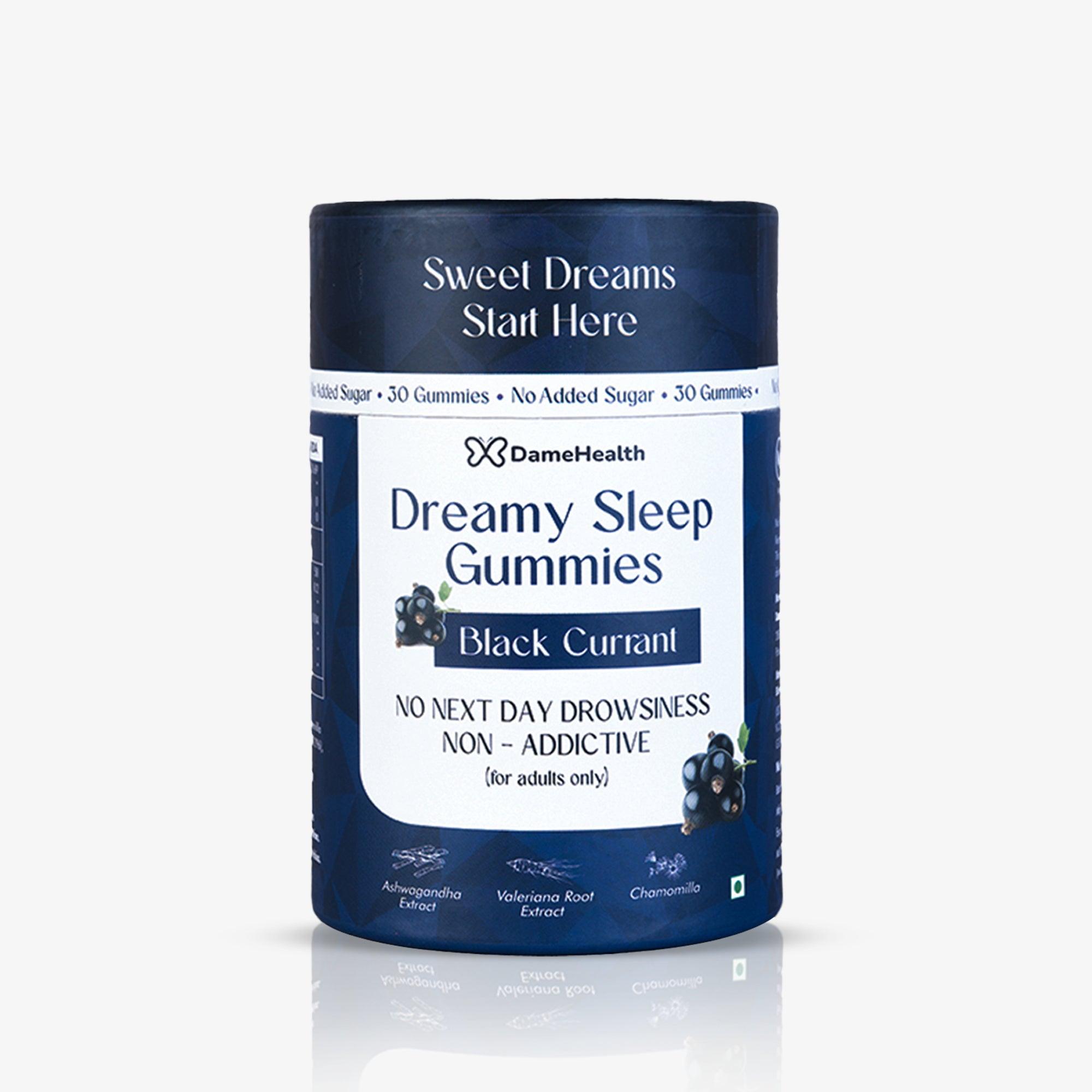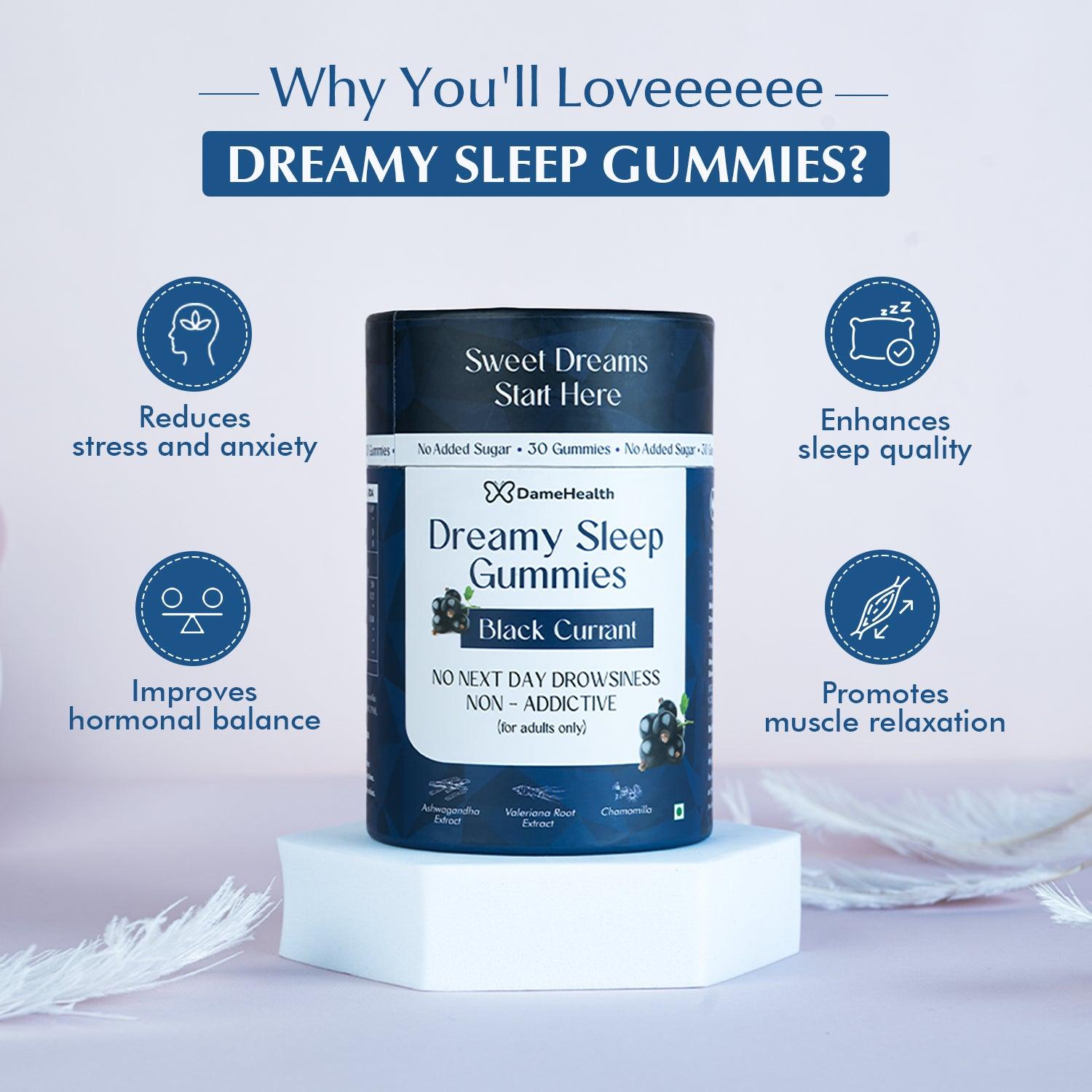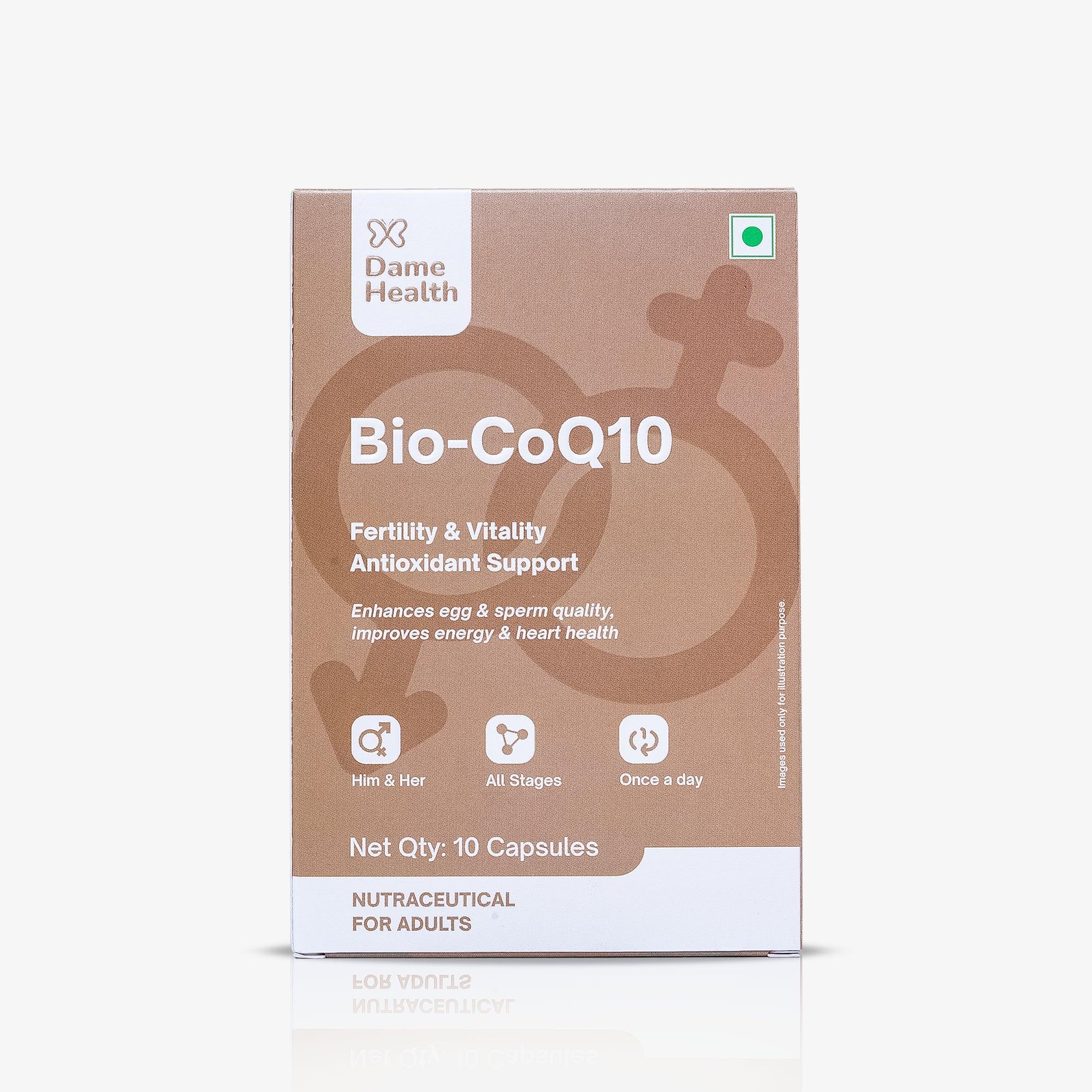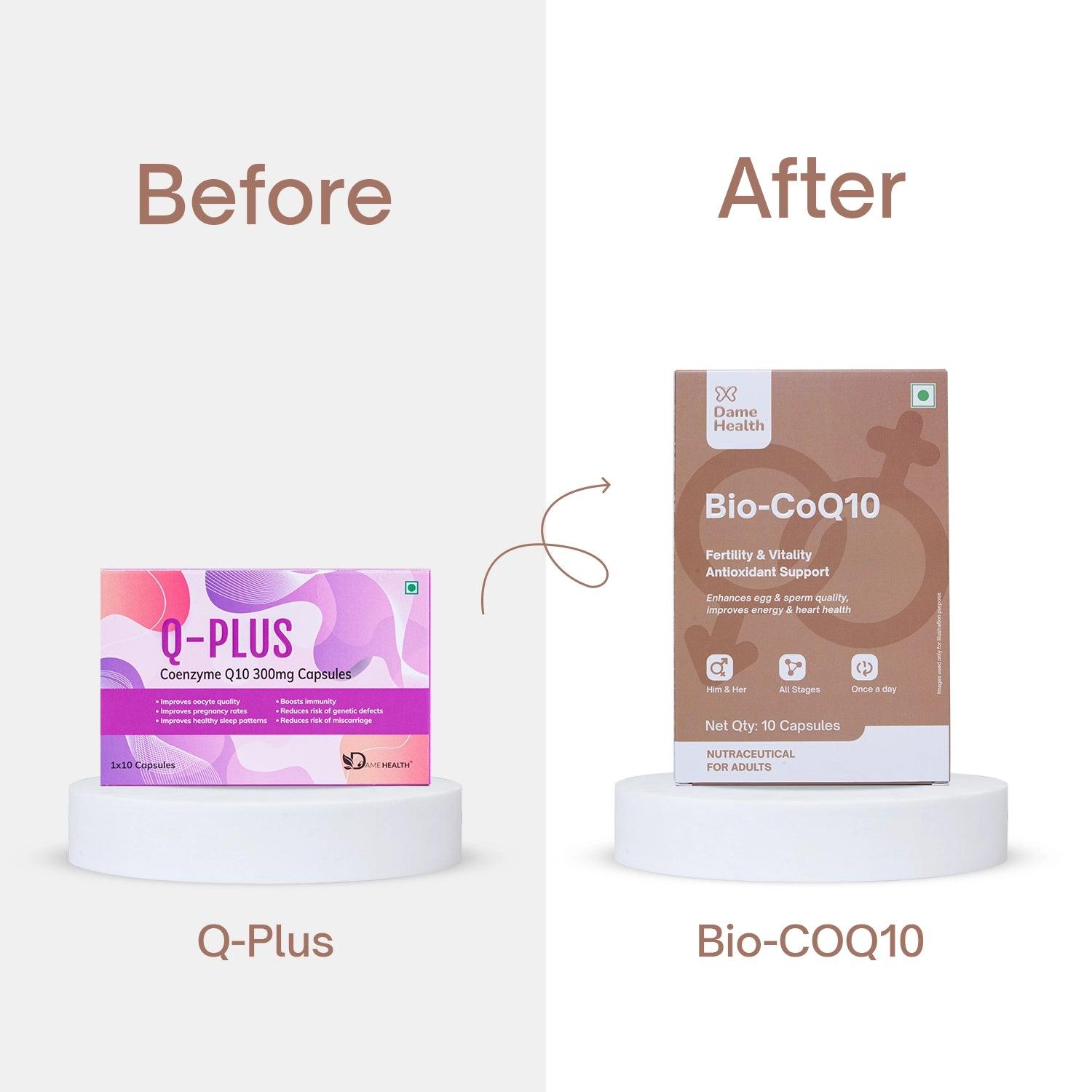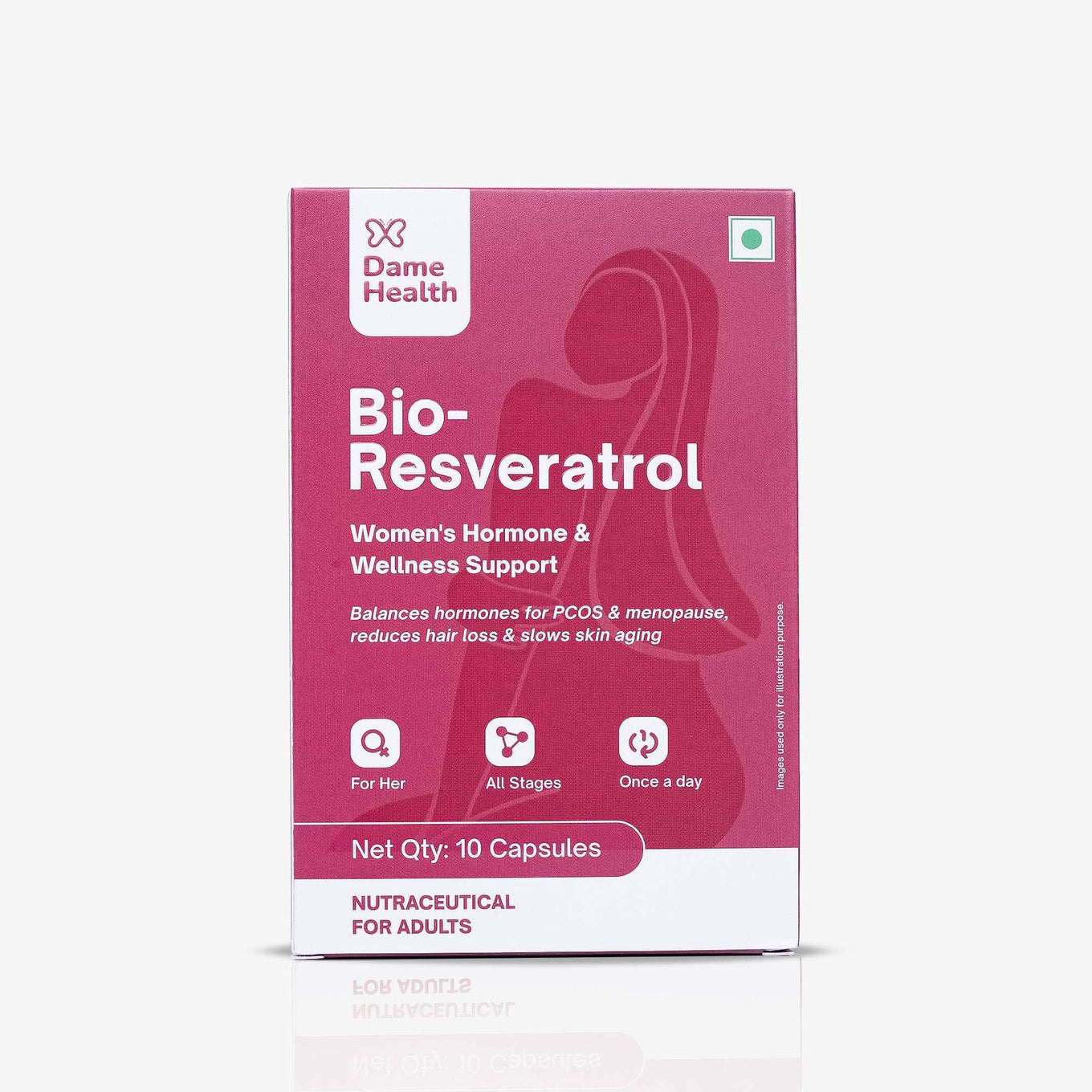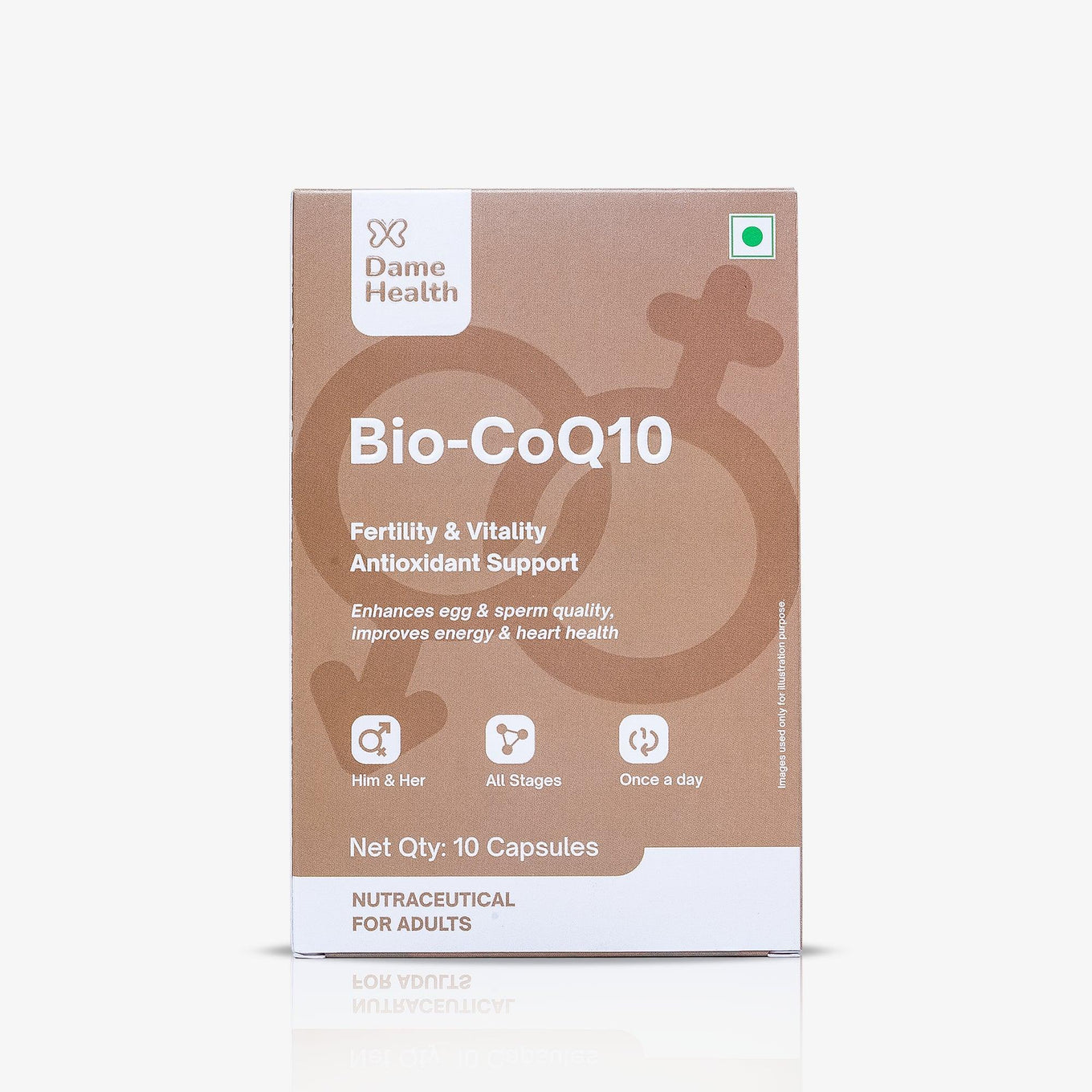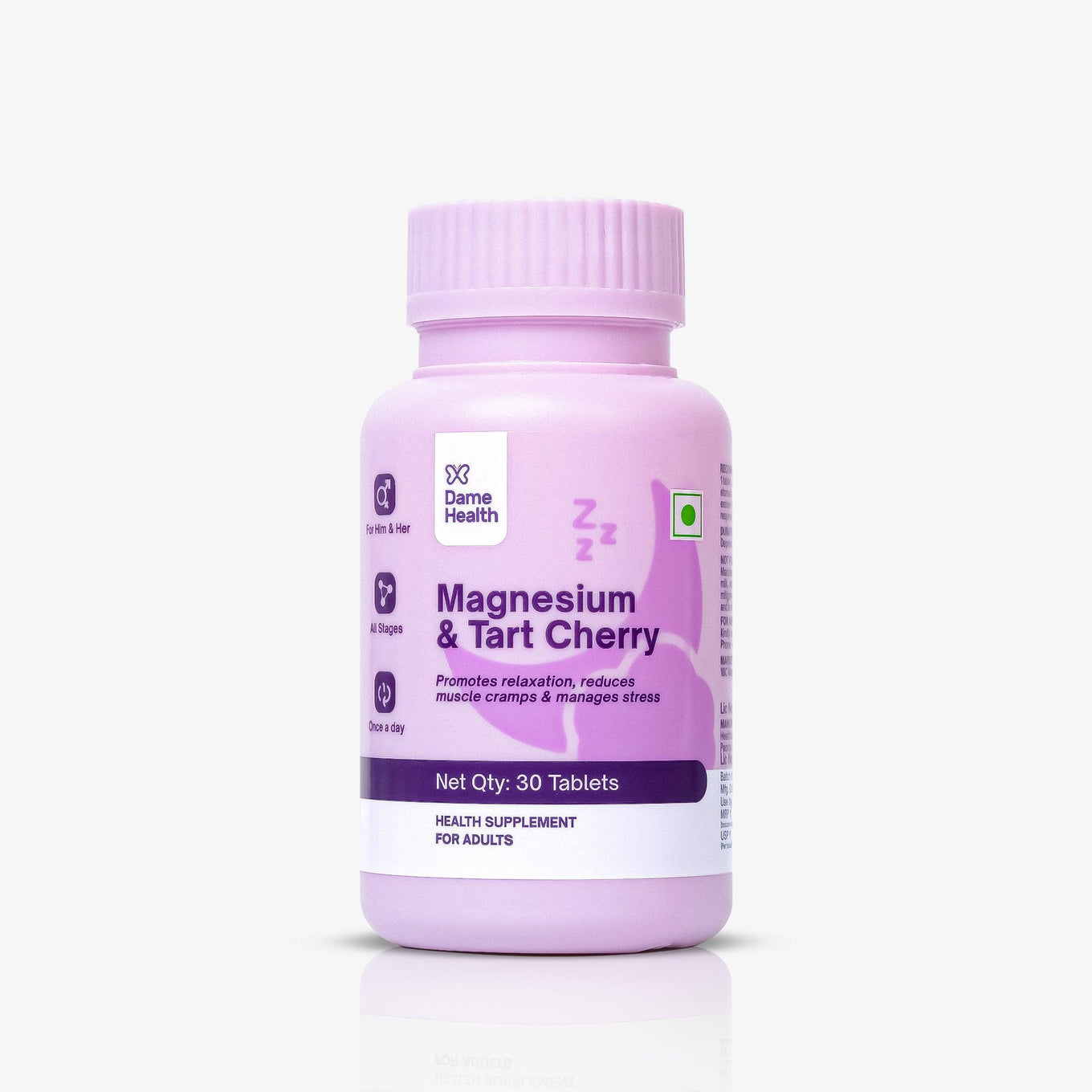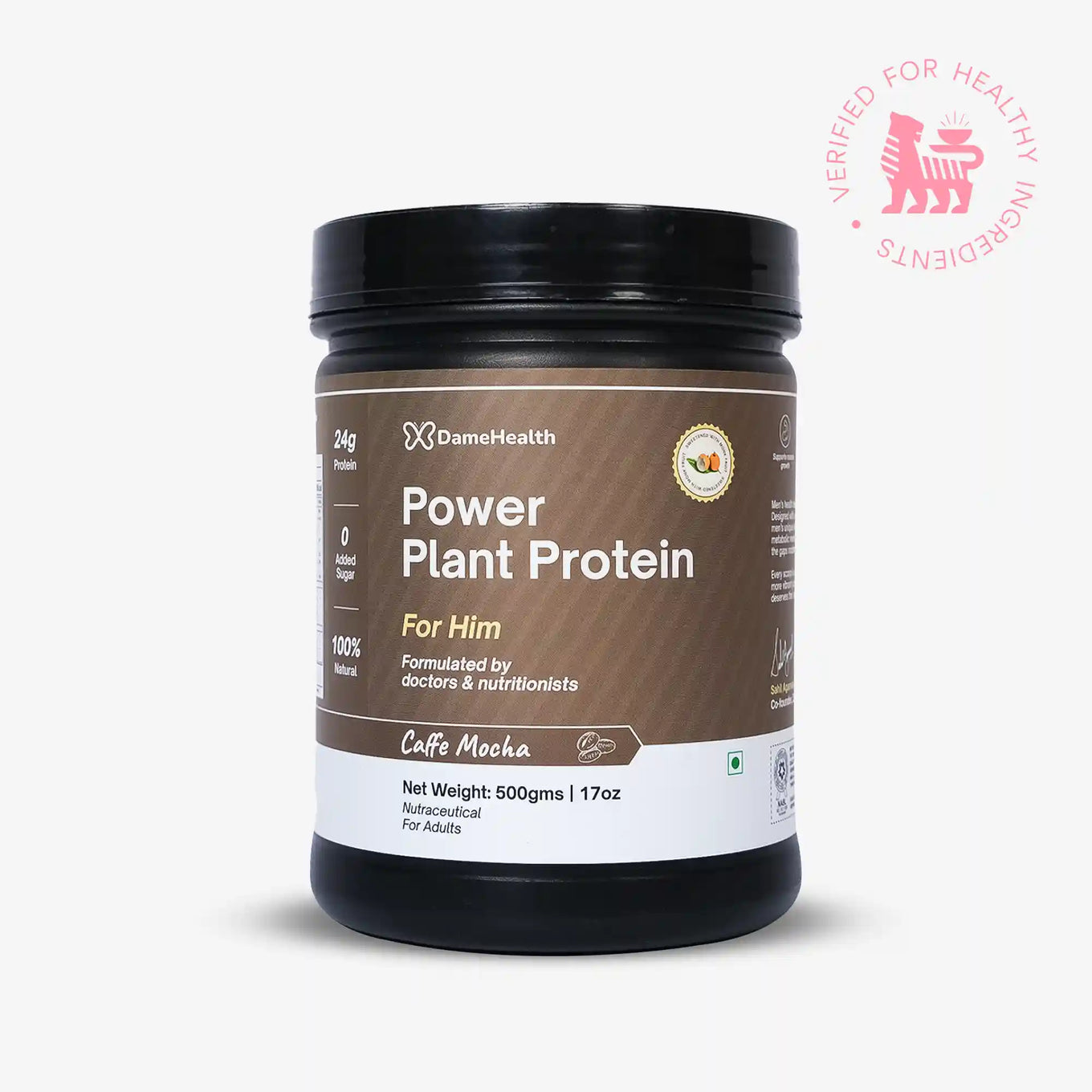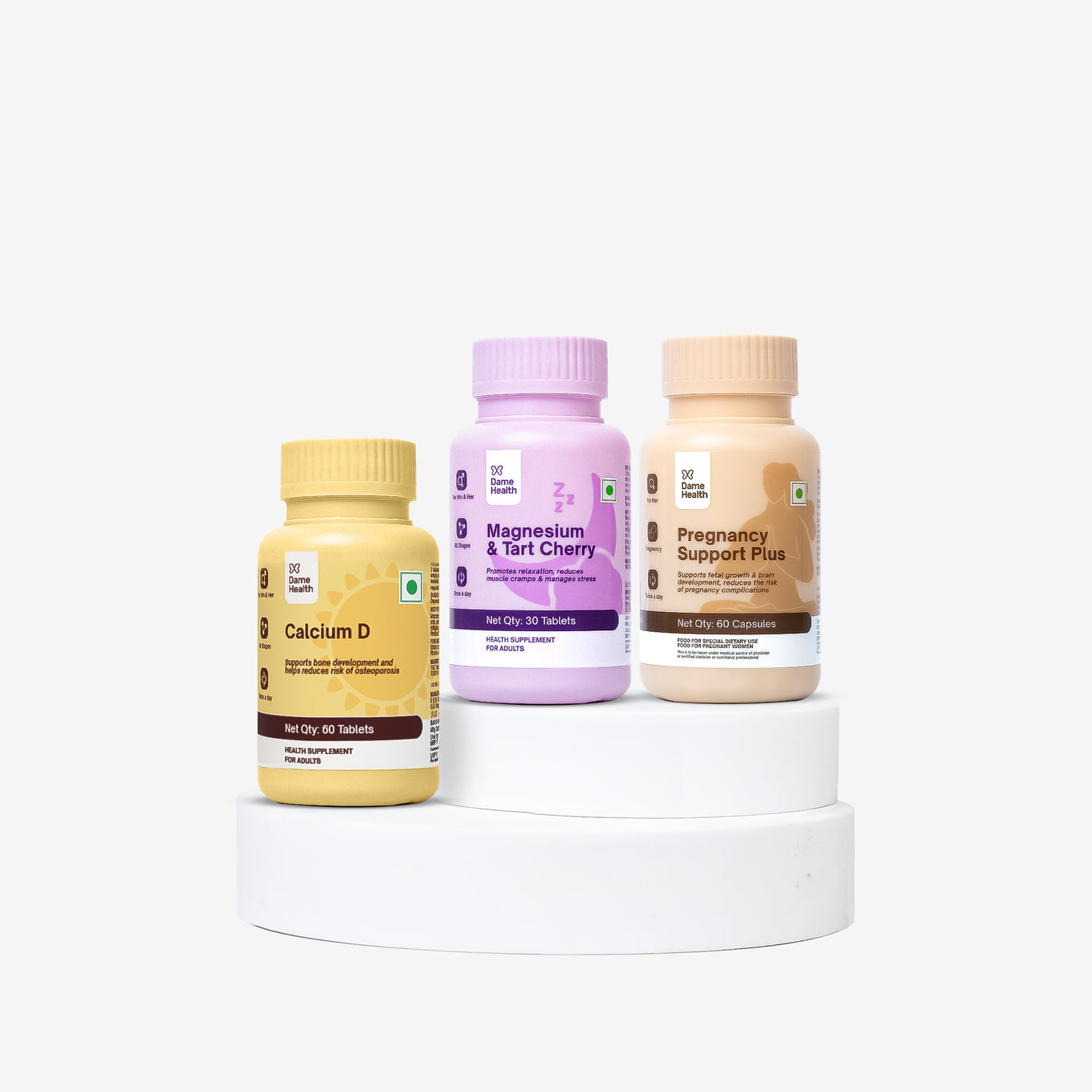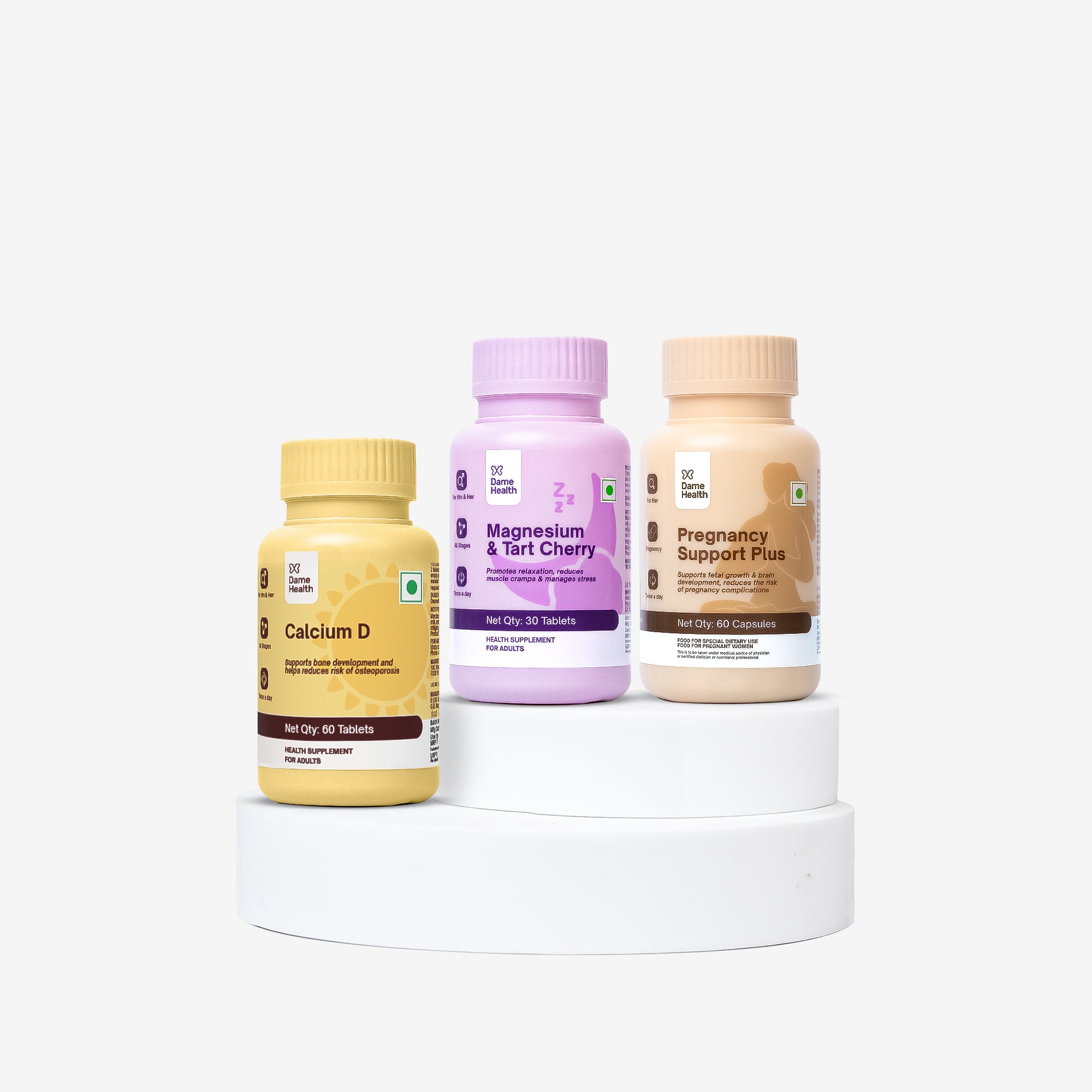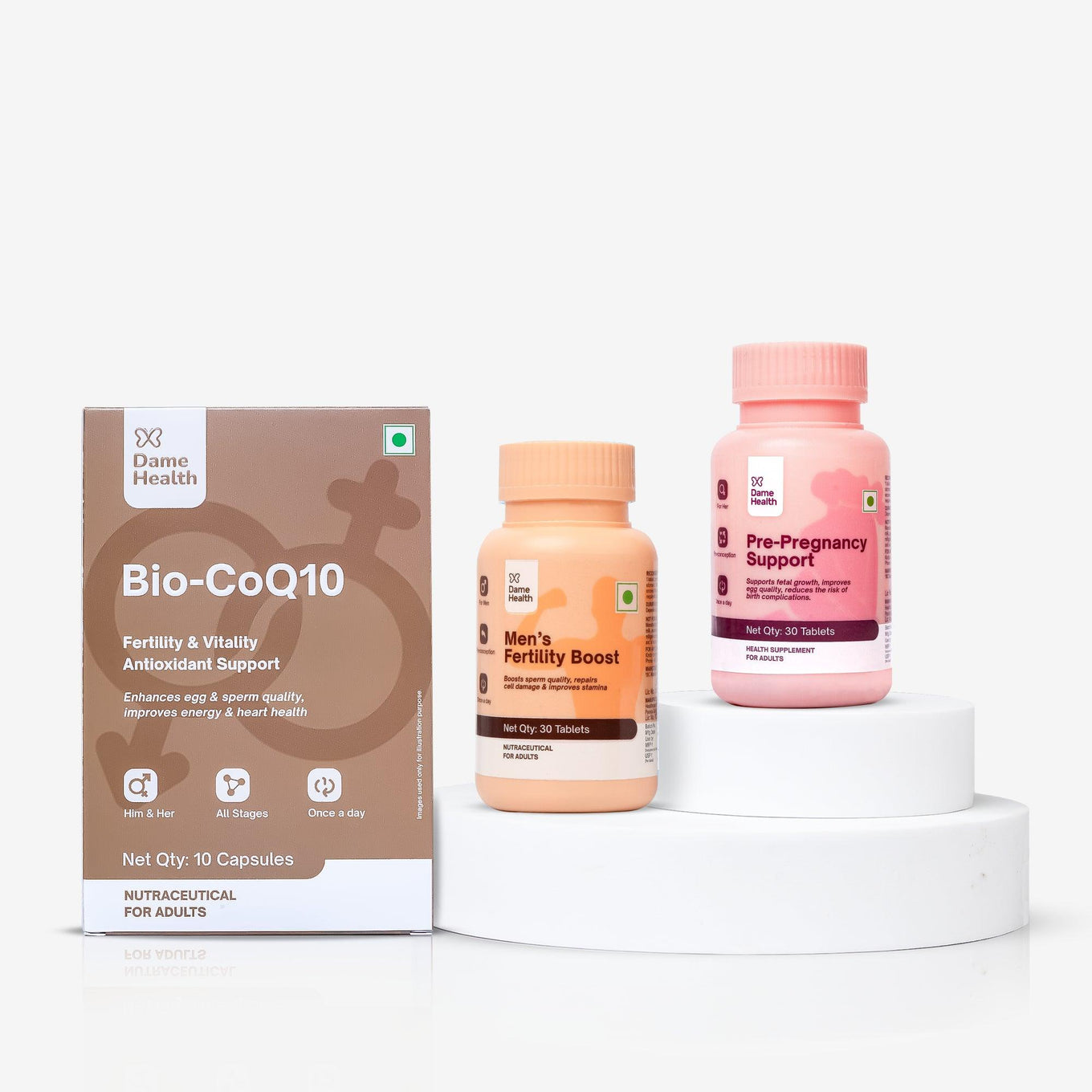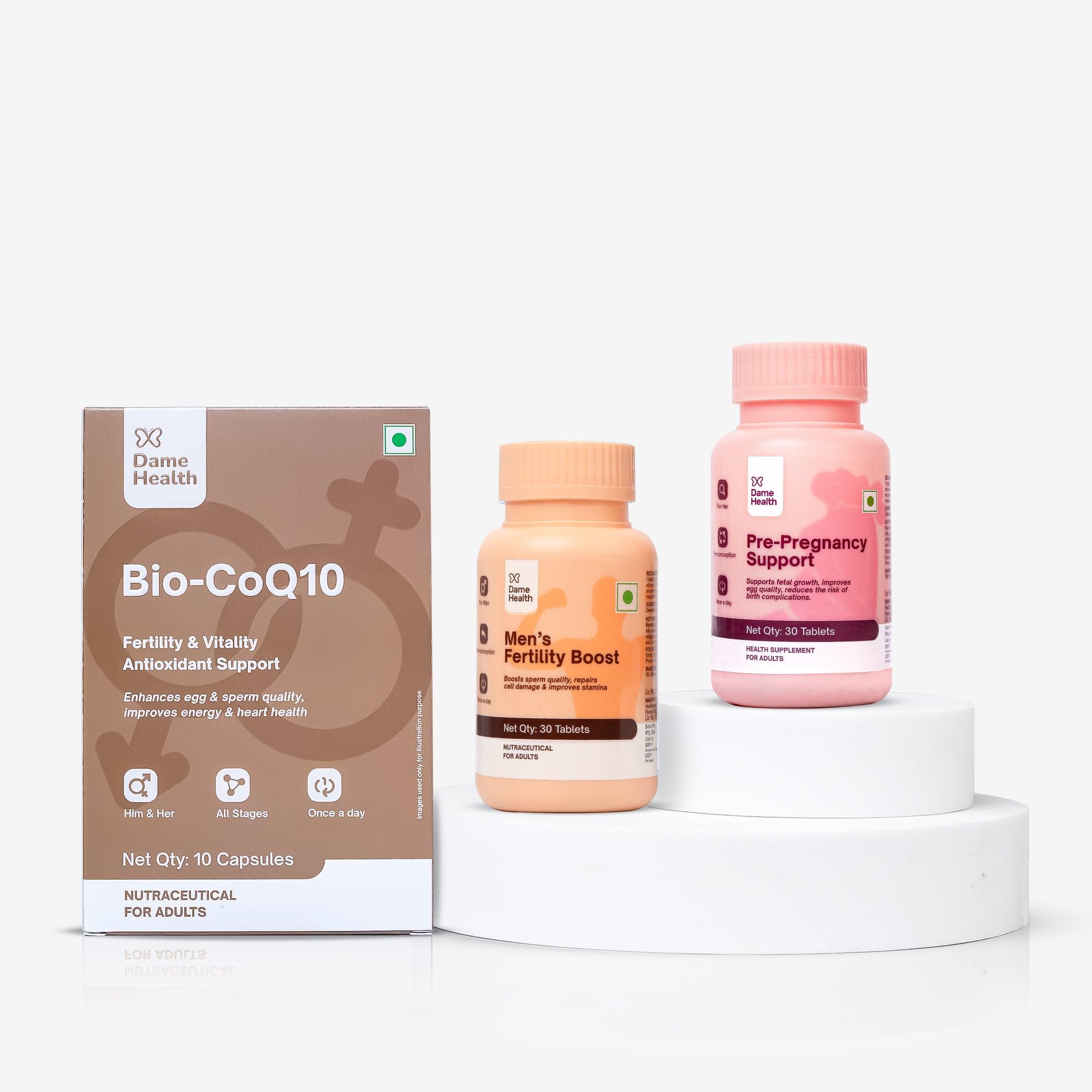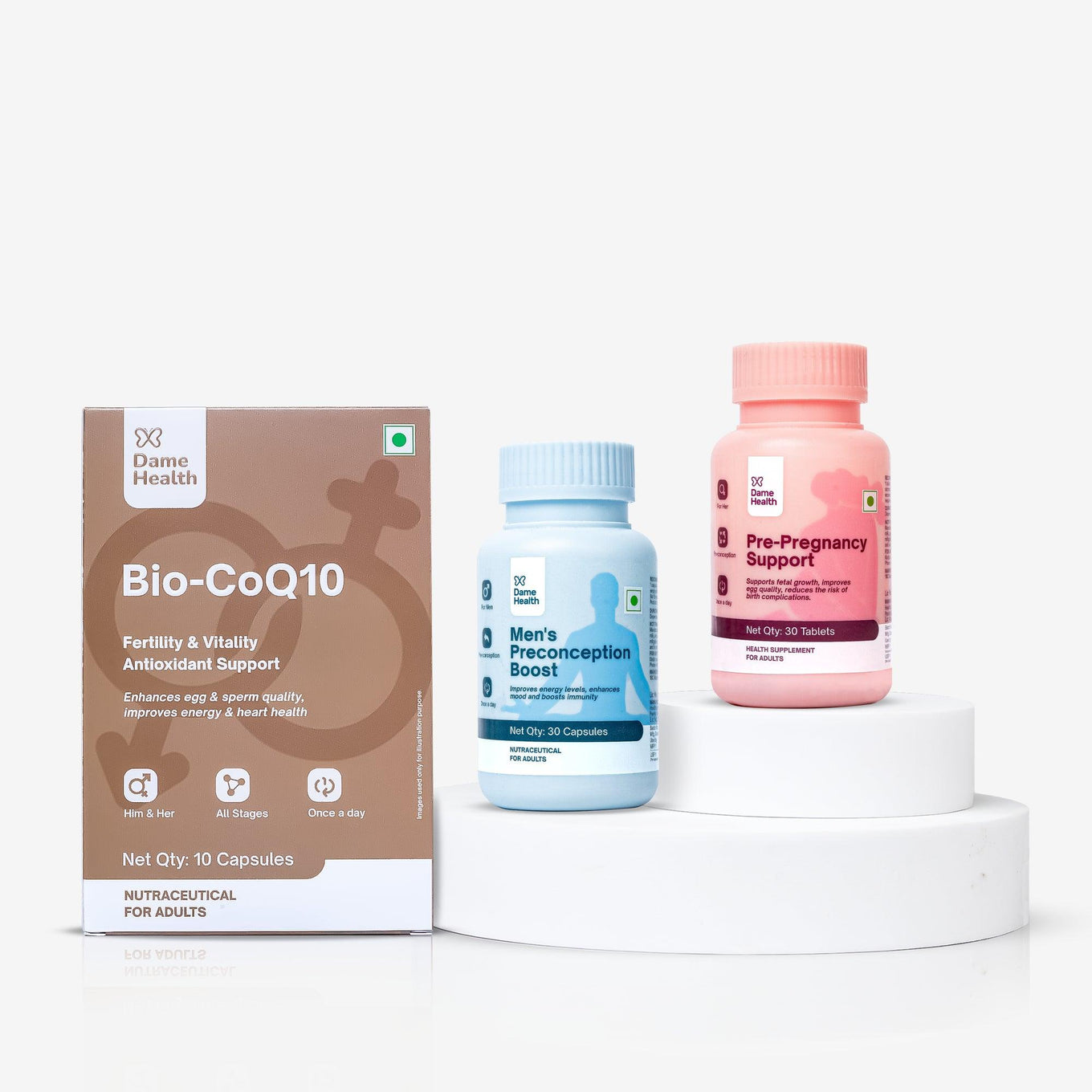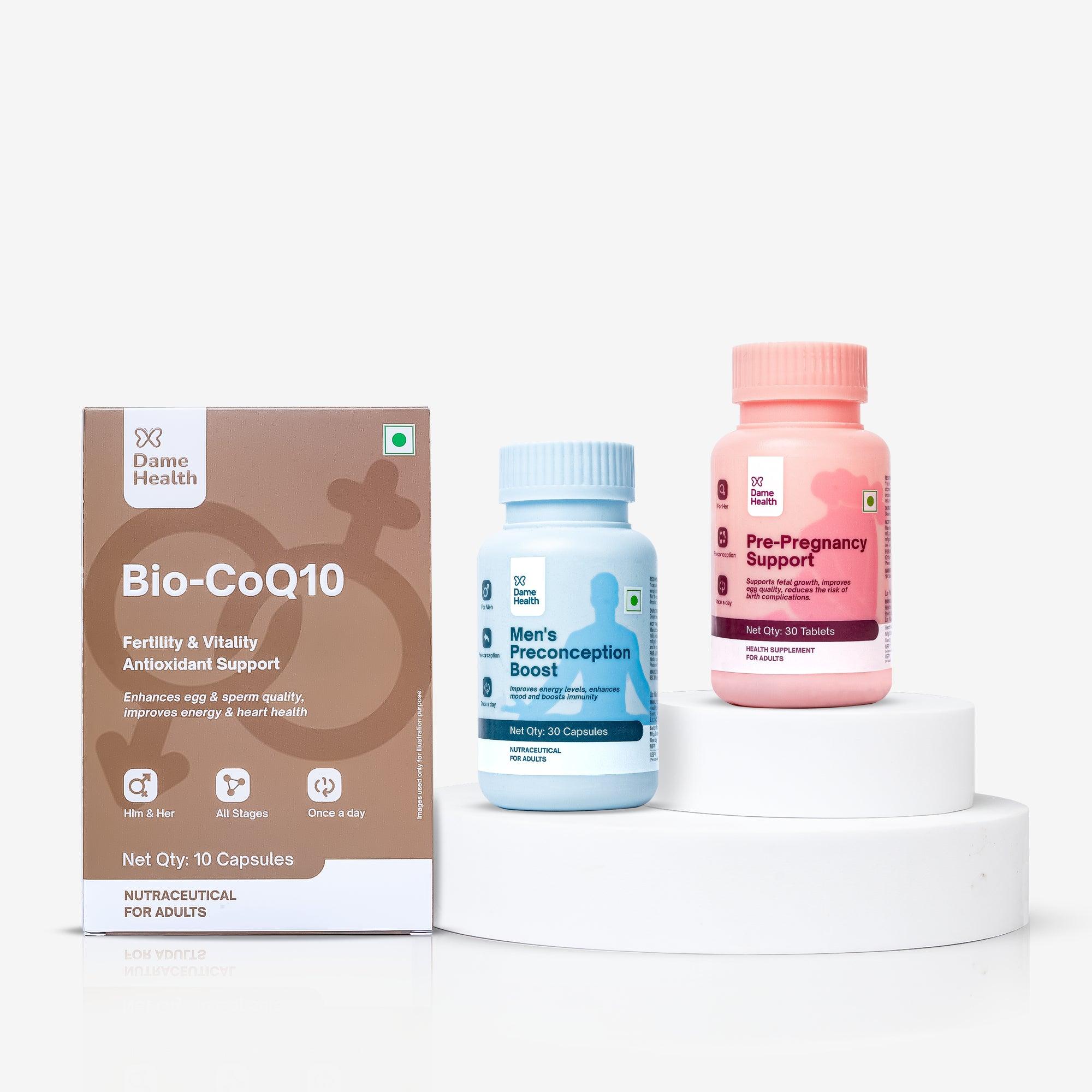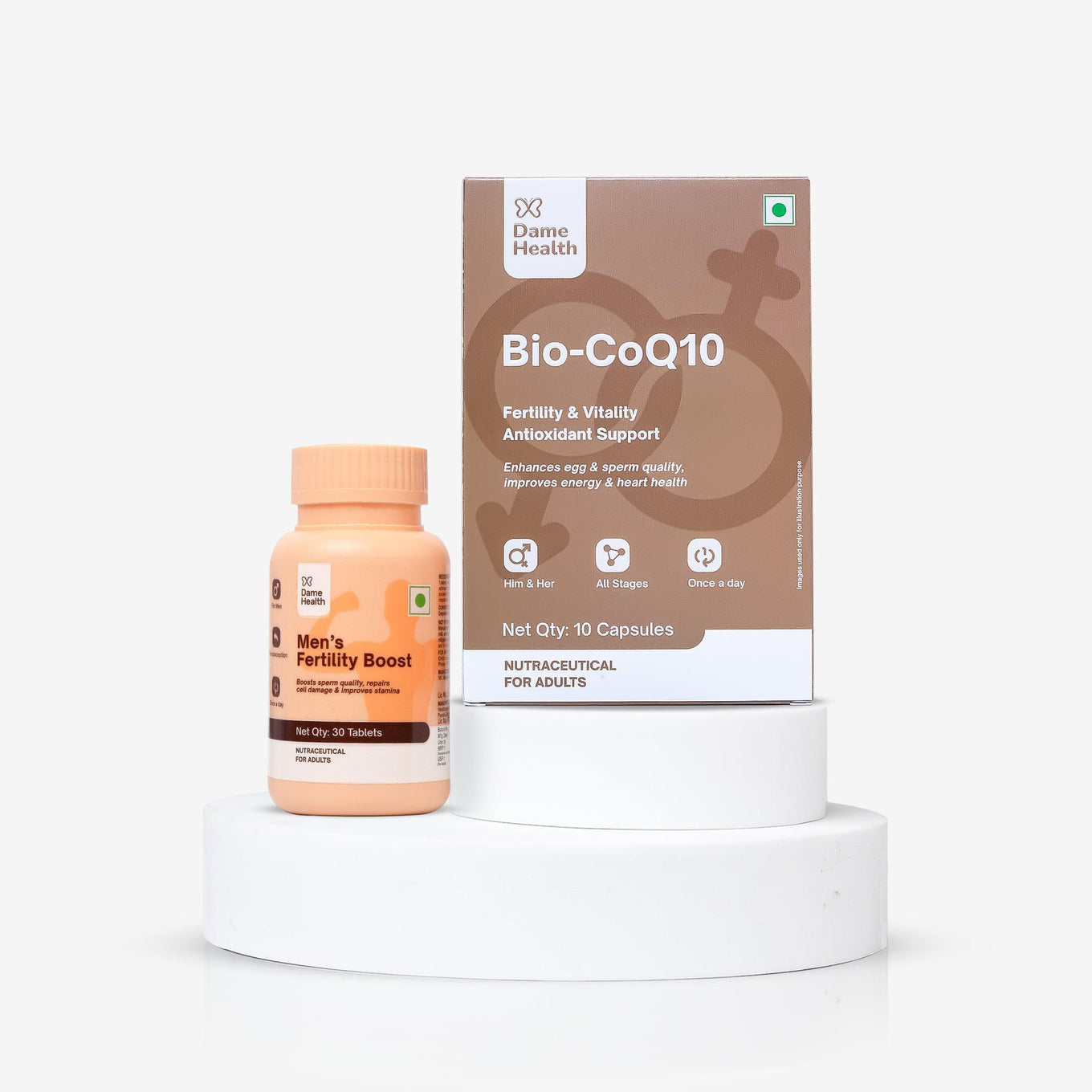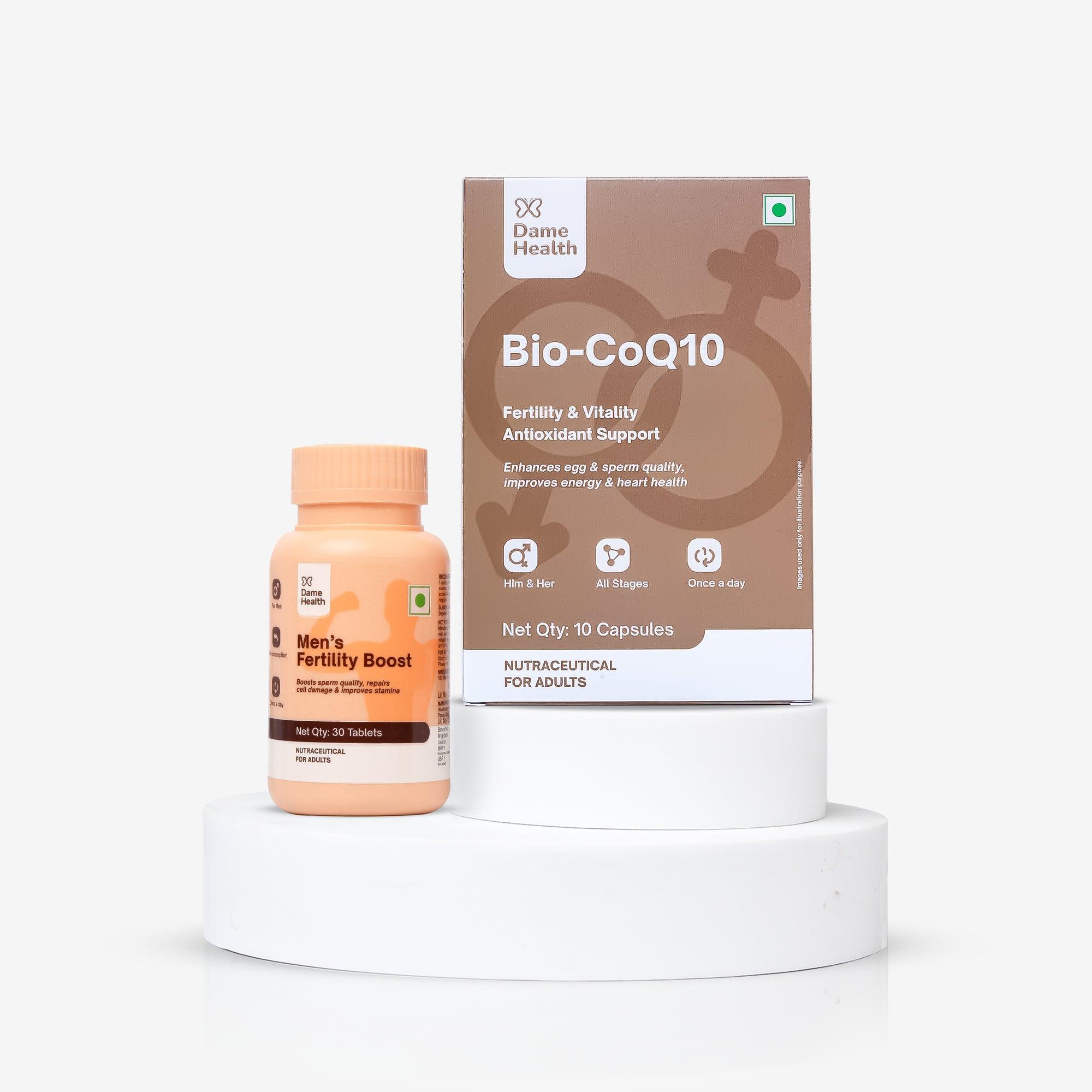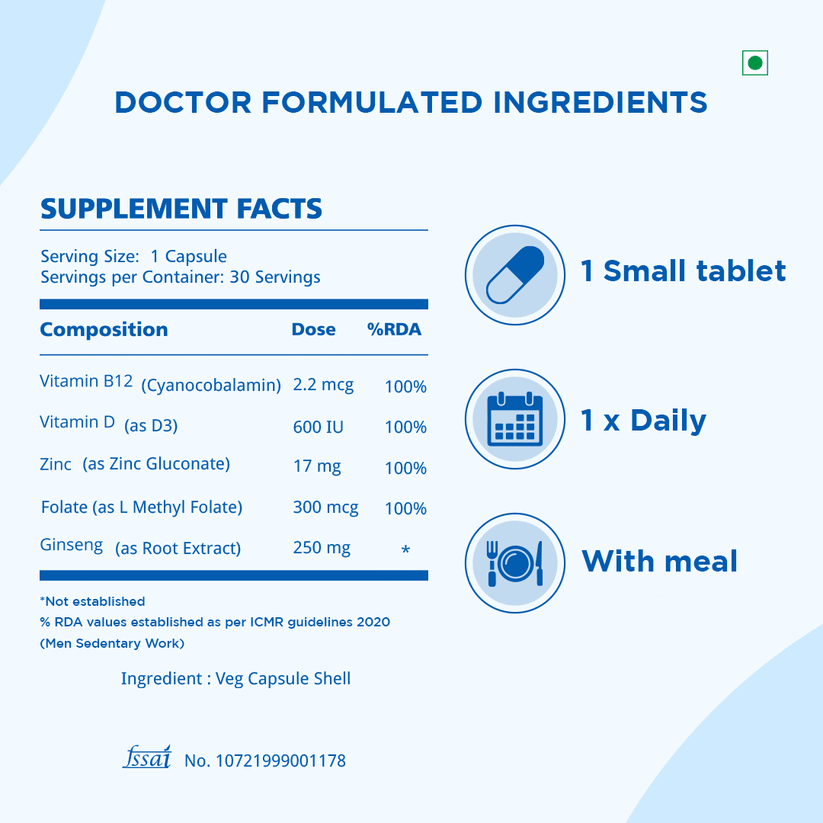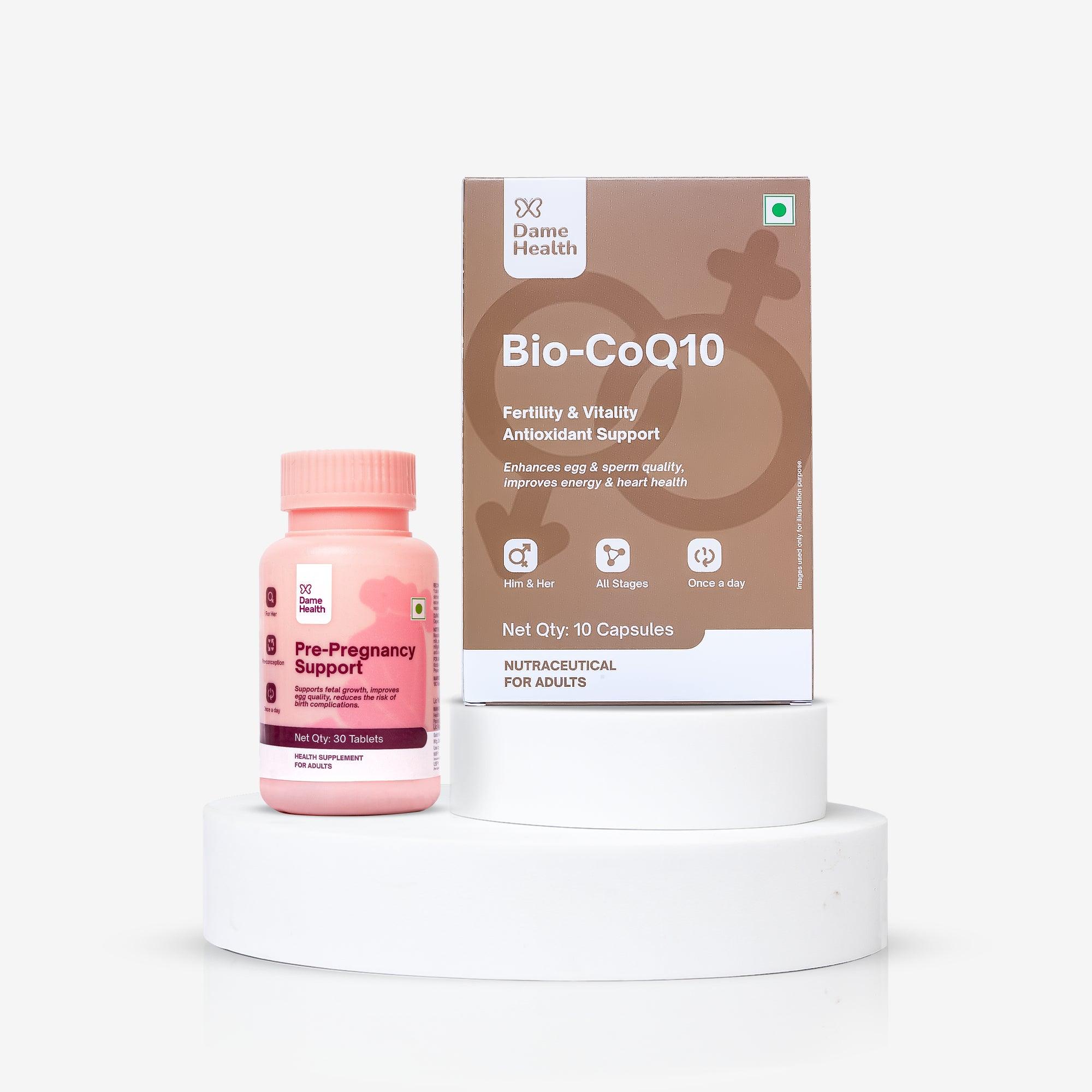Clinically backed, Expert formulated supplements
for you, Made by highest bio-availability
for you, Made by highest bio-availability
We’re Buzzing…
It’s all thanks to you!
Find your Wellness
 Women
Women Men
Men PCOS
PCOS Fertility
Fertility Pregnancy
Pregnancy Menopause
Menopause
Our Wellness Bestsellers
Scientifically backed solutions supporting thousands every day
Type:
Plant Protein l All Natural Protein for Women
Type:
Plant Protein l All Natural Protein for Men
Type:
Men's Fertility Boost I Men's Complete Care Multivitamin
Type:
Magnesium & Tart Cherry | Essential Multivitamin for Stress, Sleep & Muscle Health
Type:
Bio-Resveratrol | Advanced Hormonal Balance & Anti-Aging Formula
Type:
Pregnancy Support Plus I Women's Complete Prenatal Multivitamin
Type:
Dreamy Sleep Gummies
Type:
Bio-CoQ10 I Powerful Antioxidant for Men and Women
DameHealth Diaries
Real voices, real transformations!
Natural support to ease anxiety, reduce stress, and improve sleep quality.
Essential nutrients to boost energy, support recovery, and maintain overall wellness
Essential multivitamin for women to boost fertility, energy levels, and overall immunity
Taking care of each other or planning to extend your family, these are here to support your journey
The Dame Standard
Redefining Excellence, The Dame Standard Way
Health Solutions
Treatments
Leading Experts
Transparent Care
to Well-being
Find Your Perfect Plan
Targeted care, simplified for you.
Type:
Couple Preconception Plan
Type:
Women’s Fertility Bundle
Type:
Men Fertility Plan
Type:
Couple Fertility Plan
The Damehealth Story
Two Generations, One Vision — Championing Women’s Health
The Damehealth Story
Two Generations, One Vision — Championing Women’s Health
What happens when a father-son duo puts their heads together? They create DameHealth, a brand that’s all about turning awkward health convos into empowering wellness solutions. With dad’s wisdom and son’s passion, they’ve built a space where women’s health gets the love, care, and (of course) humor it deserves. Because who knew family talks could lead to something this game-changing?

What happens when a father-son duo puts their heads together? They create DameHealth, a brand that’s all about turning awkward health convos into empowering wellness solutions. With dad’s wisdom and son’s passion, they’ve built a space where women’s health gets the love, care, and (of course) humor it deserves. Because who knew family talks could lead to something this game-changing?
Meet the Brains Behind the Science
They’ve Got the Degrees, We’ve Got the Feels!

Dr. Apoorva Reddy

Priyanka Goenka

Dr. Mahima Lalwani

Dr. Rajeev Agarwal

Dr. Niranjana Jayakrishna

Talk to Our Health Gurus
What Sets Dame Apart?
Scientifically backed solutions supporting thousands every day






Insights from our blog!
Supplements to Start 90 Days Before IVF or IUI
Your preconception window matters more than you think. When it comes to assisted reproductive treatments like IVF or IUI, many women focus on procedures and timelines. But what happens before treatment—the 90-day prep window—can have just as much impact on outcomes. Why? Because it takes about 90 days for an egg to mature before ovulation, meaning what you feed your body during that time directly influences egg quality, hormone health, and uterine readiness. Supplements can’t guarantee conception, but the right ones may help optimize your body’s internal environment for success. 1. Prenatal Multivitamin with Methylated Folate One of the most important supplements to start early is a high-quality prenatal vitamin. Folate is key for fetal neural development—but not just any folate will do. Many women (especially those with PCOS or MTHFR gene variations) struggle to convert synthetic folic acid into its usable form. Look for methylated folate, which is more bioavailable. Try: DameHealth Pre-Pregnancy Support — an expert-formulated prenatal with bioactive folate, iron, iodine, and vitamin D to support ovulation, hormone balance, and overall preconception health. 2. Coenzyme Q10 (CoQ10) CoQ10 is a mitochondrial antioxidant that supports energy production within cells—including eggs. Several studies have shown that supplementing with CoQ10 may improve egg quality, especially in women over 30 or those undergoing IVF. It also helps reduce oxidative stress, a common factor in fertility struggles. Try: DameHealth Bio-CoQ10 — delivers high-absorption CoQ10 to boost cellular energy and egg resilience naturally. 3. Vitamin D Vitamin D plays a role in reproductive hormone regulation and has been linked to better IVF outcomes. Many women are deficient without realizing it, so this is a key nutrient to test for and supplement if needed. Tip: Aim for levels between 30–50 ng/mL. If deficient, your doctor may recommend 2000–4000 IU/day. 4. Omega-3 Fatty Acids (EPA/DHA) Omega-3s help regulate inflammation, support hormone balance, and may improve uterine lining and embryo development. These healthy fats are especially beneficial during egg maturation and implantation phases. If you don’t consume fatty fish 2–3 times per week, consider a clean omega-3 supplement with at least 300mg of DHA. 5. Resveratrol This antioxidant may help women with PCOS or poor ovarian response by mimicking estrogen, improving insulin sensitivity, and protecting developing eggs from oxidative damage. While still being studied, it shows promise as part of a holistic fertility prep plan. Try: DameHealth Bio-Resveratrol — a highly absorbable antioxidant designed for hormonal balance and fertility support. 6. Magnesium Often overlooked, magnesium supports hormone detoxification, sleep, egg quality, and stress resilience. It’s particularly helpful if you’re experiencing PMS, anxiety, or disrupted sleep leading up to IVF. Try: DameHealth Magnesium & Tart Cherry — a gentle blend that combines sleep support and muscle relaxation with hormone-friendly magnesium glycinate. Why The 90 Days Prep Window Matters Think of your 90-day pre-IVF period as your “fertility runway.” During this time, every cell is responding to what you eat, how you sleep, your stress levels—and your micronutrient intake. Supplements alone won’t replace good food, rest, or hydration. But they can close nutritional gaps and support your reproductive system during one of its most critical windows. And if you’re wondering where to begin—start simple. Focus on the foundations: a good prenatal, antioxidant support, and stress-friendly nutrients. Then work with your doctor or fertility coach to fine-tune based on your labwork and goals. FAQs: Pre-IVF Supplements and Planning Q1: Why is the 90-day window so important before IVF or IUI? Because it takes around 90 days for an egg to fully mature before ovulation. The environment you create during that time—through nutrition, sleep, stress management, and supplementation—can influence egg quality, hormone balance, and uterine readiness. Q2: Can supplements really improve IVF or IUI success rates? Supplements aren’t magic pills, but many support cellular health, hormone function, and nutrient repletion. When combined with a balanced lifestyle and medical care, they can create a more optimal environment for conception. Q3: Is it okay to take all these supplements together? Generally, yes—especially when taken at appropriate dosages. However, it’s always best to consult your doctor or fertility specialist to customize your regimen and check for interactions with any medications. Q4: What if I start supplements less than 90 days before treatment? Starting earlier is ideal, but any support is better than none. If you’re less than 90 days out, prioritize essentials like a methylated prenatal, CoQ10, and omega-3s to support egg and uterine health during your remaining window. Q5: Should my partner also be taking supplements before IUI or IVF? Yes! Sperm health also has a 70–90 day cycle. Antioxidants like CoQ10, zinc, folate, and vitamin C can support sperm motility and quality. You can explore DameHealth Men’s Fertility Boost for a comprehensive plan. Q6: Can I continue these supplements once I’m pregnant? Some—like prenatal vitamins and omega-3s—are safe and beneficial during pregnancy. Others (like high-dose CoQ10 or resveratrol) may need to be paused. Always review your supplement stack with your OB-GYN or fertility doctor post-conception. Q7: Do I still need a good diet if I’m taking supplements? Absolutely. Supplements are exactly that—supplementary. A whole-food, anti-inflammatory diet rich in fiber, healthy fats, protein, and micronutrients is essential for fertility and long-term wellness.
Learn moreMenopause, Oxidative Stress & the Resveratrol Connection: A Science-Backed Look at Plant-Based Hormonal Support
Menopause is more than just a hormonal shift—it’s a full-body transformation that brings about changes in mood, metabolism, skin, sleep, and more. While some women breeze through it, others face an onslaught of symptoms that seem to defy logic or predictability. What’s often overlooked in this conversation? The role of oxidative stress—and how antioxidants like resveratrol may provide meaningful support. What Happens to Your Body During Menopause? As estrogen and progesterone levels decline, a ripple effect begins across various systems in the body. You may notice more fatigue, irritability, forgetfulness, or dry skin. Joint aches become more common, sleep can get patchy, and weight may creep up around the middle. One of the less talked-about contributors to these symptoms is oxidative stress—a state where the body’s natural antioxidant defenses can’t keep up with the damage caused by free radicals. This imbalance has been linked to: Faster aging of skin and joints Increased inflammation Sleep disturbances Mood swings Lower resilience against daily stress That’s where antioxidant nutrients, like resveratrol, come into play. The Science Behind Resveratrol’s Menopause Support Resveratrol is a polyphenolic compound found in grapes, blueberries, and certain medicinal plants. While it rose to fame for its heart health benefits, newer research has zoomed in on its potential role in female hormonal health. What makes it interesting for midlife women is this: resveratrol has both antioxidant and phytoestrogenic effects—meaning it not only protects cells from damage but also gently interacts with estrogen receptors in the body. Studies have shown that: Resveratrol may reduce inflammation, easing symptoms like joint discomfort and fatigue. It supports vascular function, which could help ease hot flashes caused by blood vessel reactivity. Its neuroprotective benefits may positively impact mood, memory, and sleep quality. It may also offer skin and bone protection, areas that often suffer due to estrogen decline. Why It’s About Building Resilience, Not Replacing Hormones Unlike hormone therapy, which replaces estrogen directly, resveratrol takes a modulatory, supportive approach. It’s not about overriding your body’s changes—it’s about helping you adapt with strength, clarity, and calm. Think of it as a daily nutrient ally—something that quietly supports your transition without overwhelming your system. Of course, it’s not a magic bullet. Resveratrol works best when paired with smart lifestyle habits: nourishing food, strength training, sleep hygiene, and emotional regulation. Choosing the Right Resveratrol Supplement If you’re exploring supplements, be choosy. Resveratrol’s effectiveness depends heavily on purity and bioavailability. Look for supplements that: Clearly state the type of resveratrol (trans-resveratrol is more active) Are free from fillers, artificial additives, or unnecessary binders Come with third-party testing or transparency in sourcing Are formulated with women’s health in mind Menopause Support Starts With Awareness This stage of life deserves more than outdated stigma or vague promises. Women deserve science-backed, natural tools that respect the complexity of the body and the power of the mind. Whether you’re navigating perimenopause or well into the transition, supporting your body with antioxidants like resveratrol can be a thoughtful addition to your routine. It’s not about chasing youth—it’s about preserving vitality and balance in a time that asks you to slow down and reconnect with yourself. FAQs Q: Does resveratrol actually balance hormones? Not directly. It may help modulate estrogen activity and reduce inflammation, which in turn supports overall hormonal harmony. Q: Can I take resveratrol with other supplements? Generally, yes—but consult your doctor, especially if you're already on medications or hormone therapy. Q: When should I start resveratrol? Early perimenopause is a good window, but it's helpful anytime during the menopause transition if you’re experiencing fatigue, mood shifts, or inflammation.
Learn moreWhat Does Hormonal Imbalance Actually Feel Like? Early Signs Women Shouldn’t Ignore
Hormones are the messengers behind nearly every major function in your body—metabolism, mood, energy, menstrual cycles, skin, sleep, and even how hungry or calm you feel. So when they’re out of sync, your body will tell you. The problem? It’s not always obvious. Hormonal imbalance often starts subtly. It doesn’t wave red flags—it whispers. One month it’s bloating. The next, your period comes early… or not at all. You feel “off” but can’t quite explain it. Let’s break down what hormonal imbalance actually feels like, how to spot it early, and what you can do—naturally and proactively—to bring your body back to balance. The Body’s First SOS: Early Signs of Hormonal Imbalance 1. Mood Swings, Irritability, or Anxiety We’ve all had days when we feel “off.” But if emotional rollercoasters become routine—especially before your period—it could be more than stress. Your hormones, especially estrogen and progesterone, directly affect the brain chemicals serotonin and GABA. These neurotransmitters are essential for staying calm, emotionally resilient, and mentally steady. When hormone levels dip or fluctuate wildly, it can feel like you’re losing control over your emotions. You might find yourself: Crying at things that normally wouldn’t phase you Snapping over minor issues Feeling anxious without a clear trigger Lacking your usual motivation or drive This emotional volatility is common in both PCOS and perimenopause. So if your mood feels like a mystery you can’t solve, your hormones might be the missing link. 2. Irregular Periods or Menstrual Discomfort Think of your menstrual cycle as your body’s monthly report card. When something’s off, your cycle often speaks first. Hormonal imbalances disrupt the natural rhythm of ovulation and menstruation. Whether it’s estrogen dominance, low progesterone, or thyroid issues, your period might show signs like: Cycles that come too early or too late Months where your period disappears altogether Spotting between cycles Painful cramps that feel worse than usual Bloating and heaviness that lingers Conditions like PCOS often show up first through cycle irregularity. If your flow feels unpredictable, your hormones are worth investigating. 3. Low Energy and Fatigue You sleep a full 8 hours, but wake up exhausted. You drink your coffee… and still crash by 3 PM. Sound familiar? Hormonal fatigue isn’t just about being “tired.” It’s a whole-body depletion that impacts your physical and mental performance. Key culprits include: Low thyroid hormone (hypothyroidism) slowing down metabolism Cortisol imbalance causing energy spikes and crashes Estrogen and progesterone drops affecting your sleep and stamina You might feel like you're dragging through your day, struggling to focus, or skipping workouts you used to enjoy. This isn’t laziness—it’s biology out of balance. 4. Unexplained Weight Gain or Difficulty Losing Weight Weight gain isn’t always about calories in vs. calories out. When your hormones are misfiring, your metabolism follows suit. Estrogen influences fat distribution, particularly around the hips and belly. Cortisol—your stress hormone—encourages fat storage around your midsection. Insulin controls blood sugar and fat storage. And your thyroid? It regulates the speed of your metabolism. So when you’re hormonally out of sync, even a clean diet and regular exercise might not yield results. Signs include: Weight gain that seems resistant to lifestyle changes Sugar cravings and sudden energy crashes Puffiness or water retention Sluggish digestion and slower fat burn Balancing your hormones often unlocks sustainable weight shifts without extreme restriction. 5. Skin Issues: Acne, Dryness, or Sensitivity Your skin is one of the clearest windows into your hormonal health. Hormonal acne typically shows up as deep, painful pimples along the chin, jawline, and neck. It often flares up in sync with your cycle, especially before your period. This happens due to elevated androgens (male hormones) or imbalanced estrogen-to-progesterone ratios. Low estrogen may also lead to: Thin, dry, or sensitive skin Increased redness or rosacea Slower wound healing or increased breakouts Itchiness or sensitivity to products that once worked If your skin has changed suddenly or worsened without a change in your skincare routine, your hormones could be to blame. 6. Sleep Disruptions Getting restful sleep is not just about bedtime habits—hormones play a central role in whether you drift off, stay asleep, and wake up refreshed. When cortisol is too high (especially from stress), it keeps your nervous system wired at night. Low progesterone—common in the second half of your cycle—can trigger anxiety and restlessness. Meanwhile, a drop in estrogen (especially around perimenopause or PMS) can cause: Night sweats Overheating Insomnia or frequent waking Many women report waking up at 2–4 AM with a racing mind, feeling hot or anxious. This is classic hormonal sleep disruption. And since poor sleep impacts everything from cravings to immunity, it's worth taking seriously. Many of these symptoms overlap with conditions like: PCOS (Polycystic Ovary Syndrome): Irregular periods, acne, weight gain, mood changes Perimenopause/Menopause: Hot flashes, insomnia, mood shifts, low libido Thyroid Dysfunction: Fatigue, weight gain, hair thinning, low mood If you’re seeing multiple symptoms, it’s worth investigating your hormone levels through a healthcare provider. What Causes Hormonal Imbalance in Women? Chronic stress → elevated cortisol disrupts estrogen/progesterone Poor gut health → affects estrogen detox and nutrient absorption Blood sugar instability → spikes insulin, impacts ovaries Overexercising or under-eating → can shut down ovulation Endocrine disruptors → found in plastics, makeup, pesticides Aging → hormonal shifts begin as early as your 30s The Fix Isn’t One Size Fits All—But It Can Be Natural While synthetic hormones or birth control may be prescribed, many women prefer a gentler approach, especially at early stages. Nutritional strategies, lifestyle changes, and targeted supplements can support hormonal balance with fewer side effects. Smart Supplementation with DameHealth Bio-Resveratrol A menopause supplement and hormone balance support tool. It mimics estrogen gently (phytoestrogenic action) and helps reduce oxidative stress—helpful in fatigue, skin health, and cycle support. DameHealth Bio-Resveratrol PCOS Conception Pack Combines pre-pregnancy support with hormone-balancing antioxidants to support regular cycles, better ovulation, and weight loss in women with PCOS. DameHealth PCOS Conception Pack These natural hormone balance tablets are ideal for those looking to improve mood, skin, energy, and fertility markers gently and consistently. Hormone Myths Worth Busting Myth 1: Hormonal imbalance only happens after 40. → Many women in their 20s and 30s experience imbalances due to stress, lifestyle, or PCOS. Myth 2: Birth control fixes hormones. → It may mask symptoms but doesn't resolve root causes. It can even suppress natural hormone production long-term. Myth 3: Irregular periods are normal. → Common doesn’t mean normal. Regular cycles = good hormonal communication. Myth 4: You need lab tests to spot imbalance. → Lab work helps, but your symptoms are valid indicators too. FAQs Q: How long does it take to restore hormonal balance naturally? A: Most women see improvement in 8–12 weeks with consistent support and lifestyle changes. Q: Are hormone balance tablets safe for long-term use? A: When plant-based and clean-label like DameHealth’s, yes—though always check with your doctor. Q: Can resveratrol help with mood and skin too? A: Yes! It’s anti-inflammatory and antioxidant-rich—great for clearer skin and mood regulation. Hormonal imbalance isn’t just a “female issue.” It’s a foundational health signal. If you’re noticing changes in your energy, mood, cycle, or body—it’s time to listen Small shifts—nutritional upgrades, stress support, smart supplements—can restore balance from within. Your hormones want to work with you. You just have to give them the right support.
Learn more- Choosing a selection results in a full page refresh.
- Opens in a new window.















